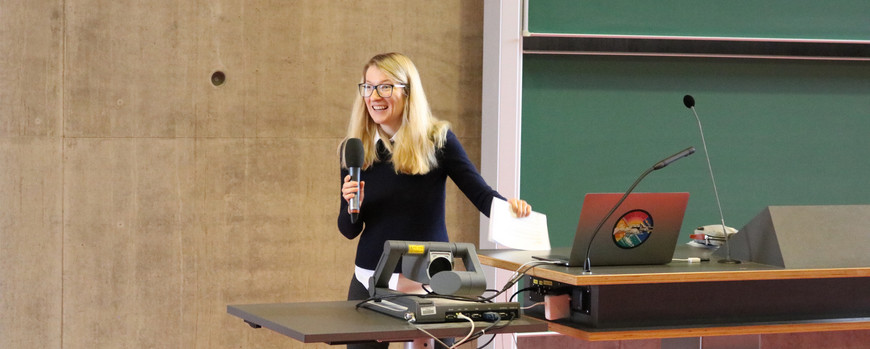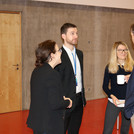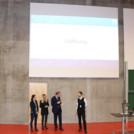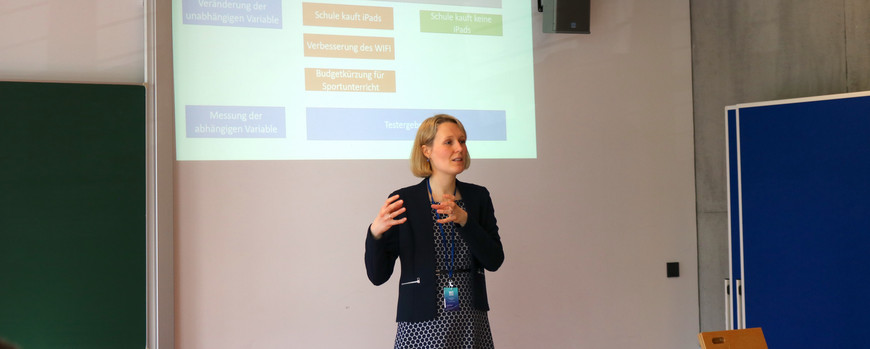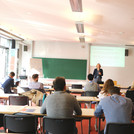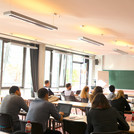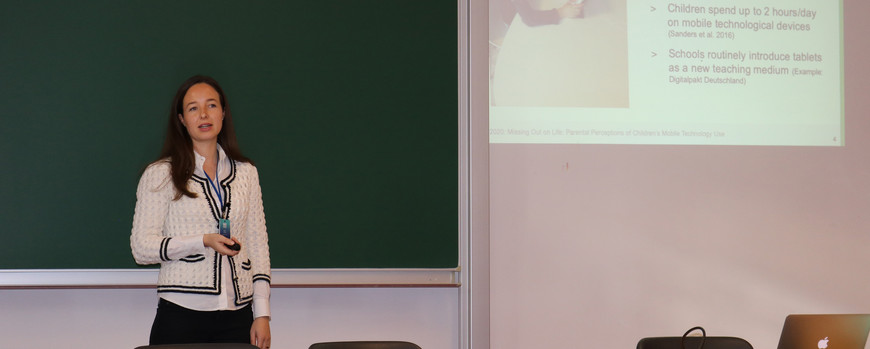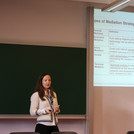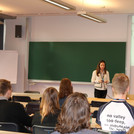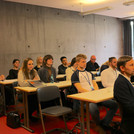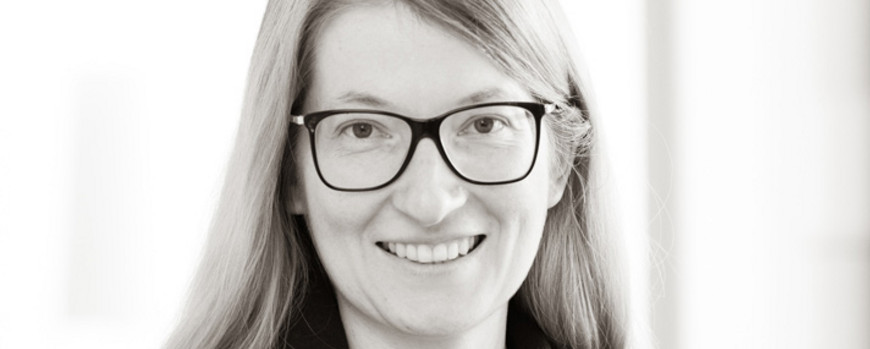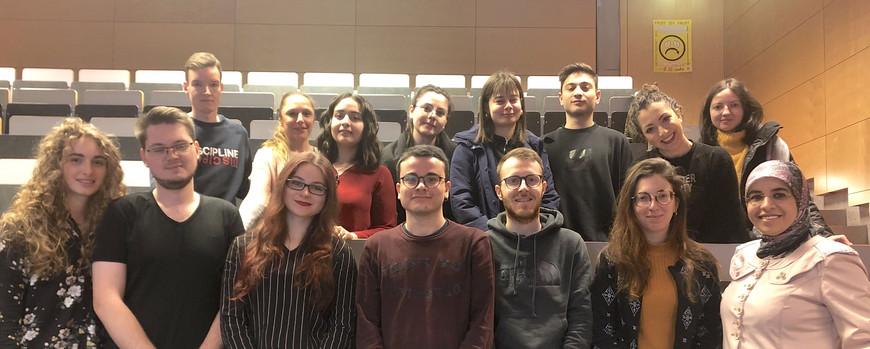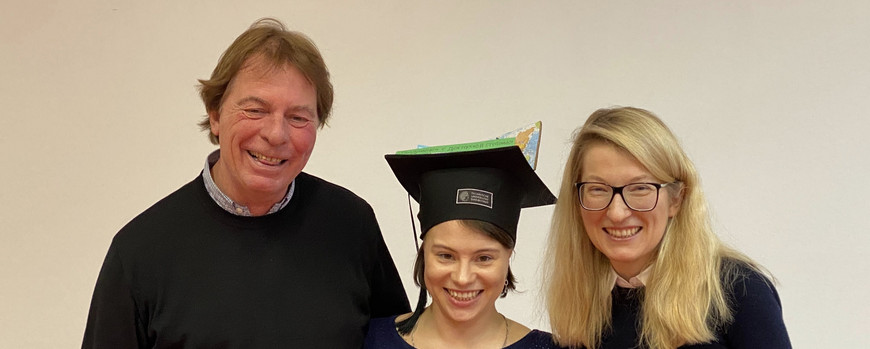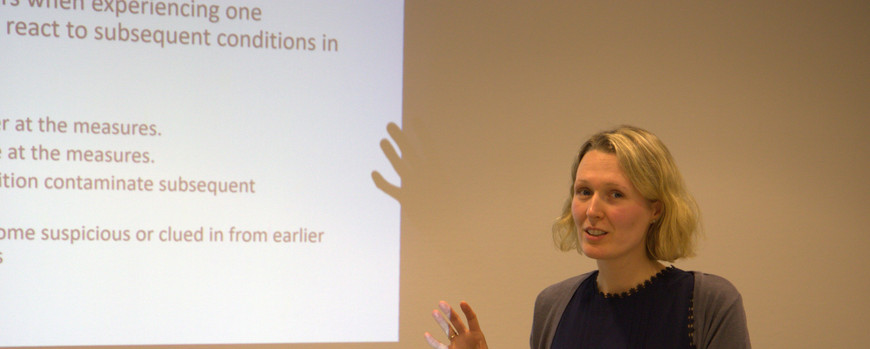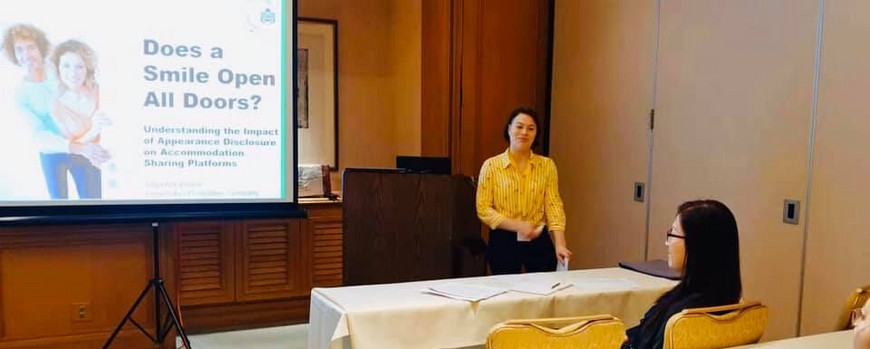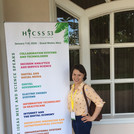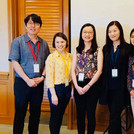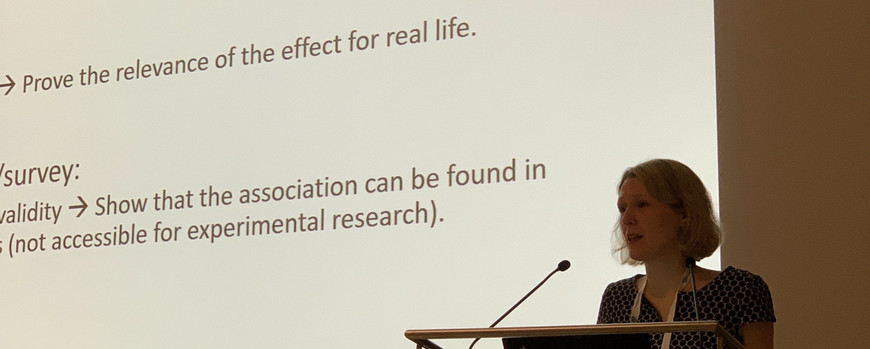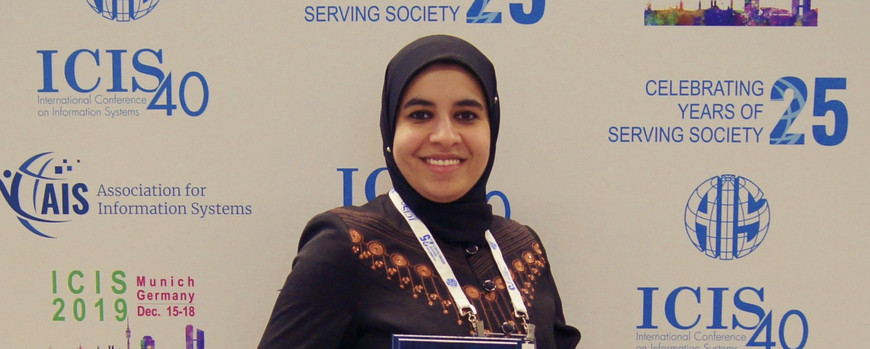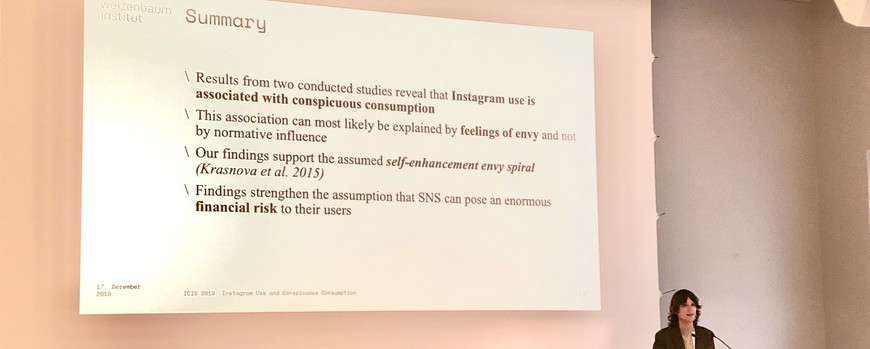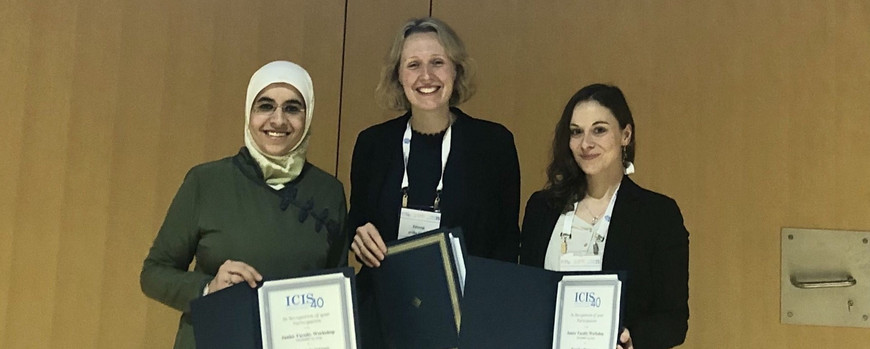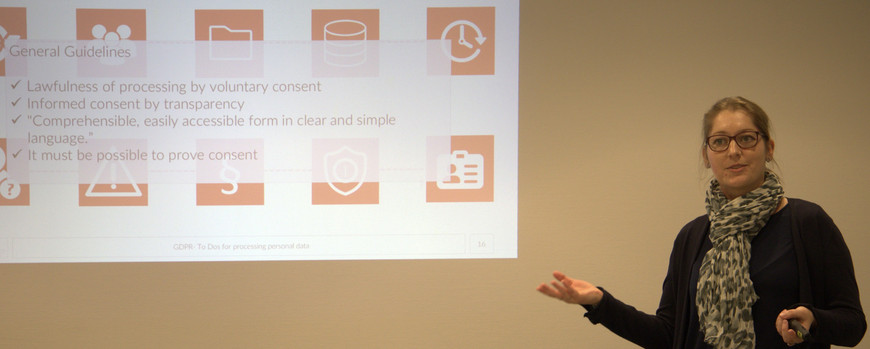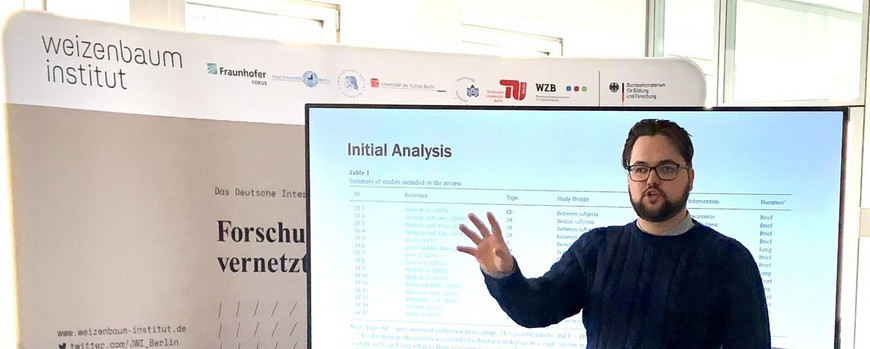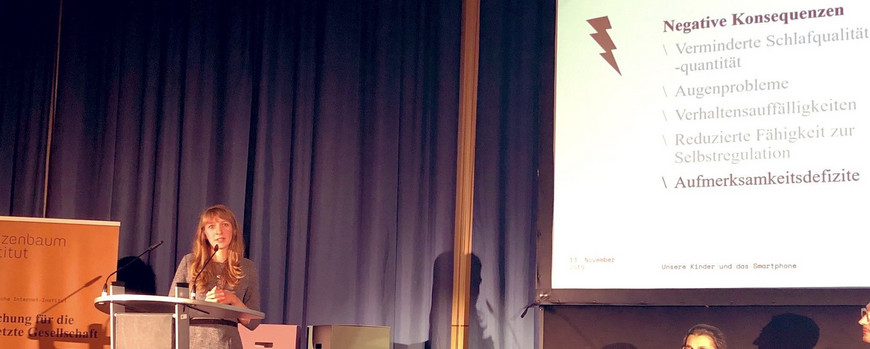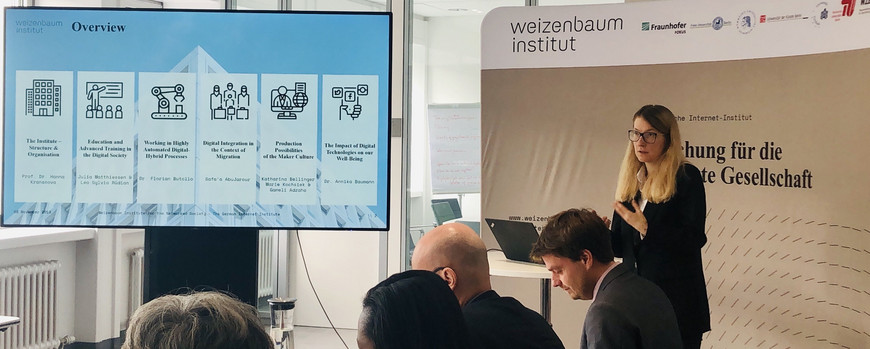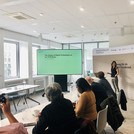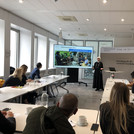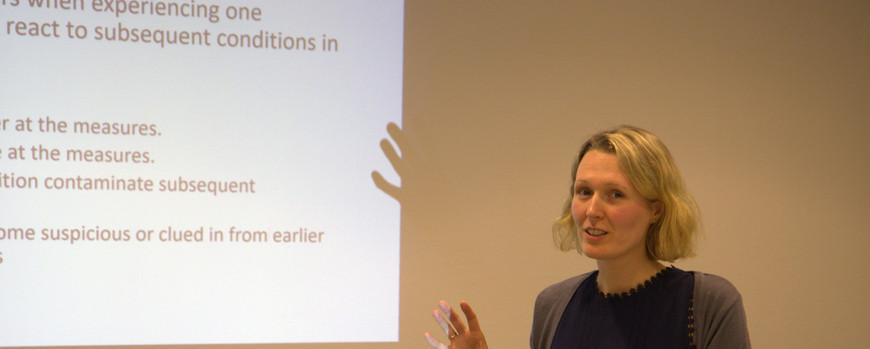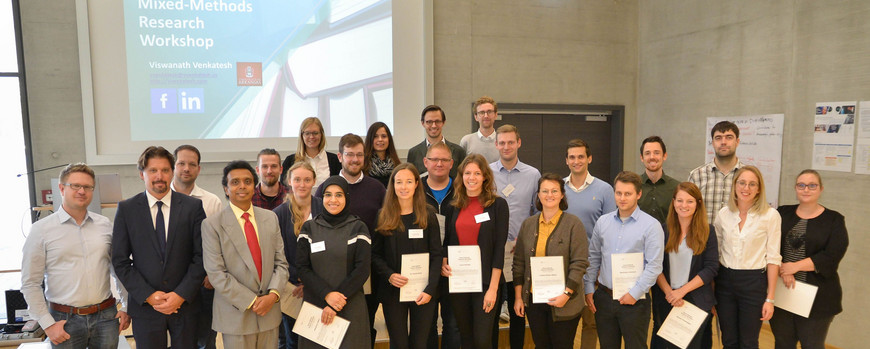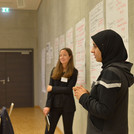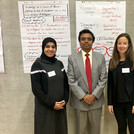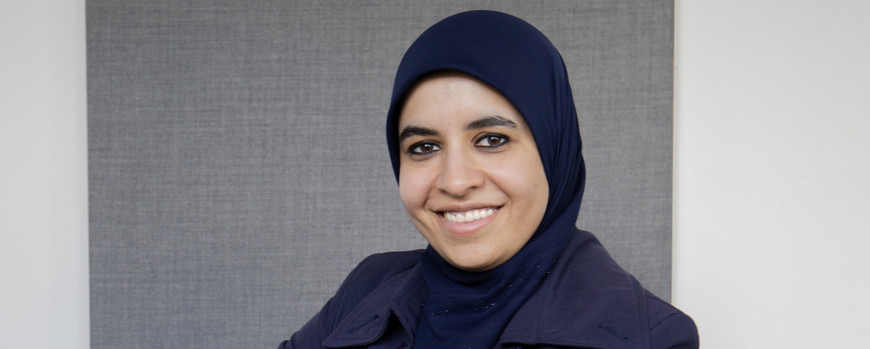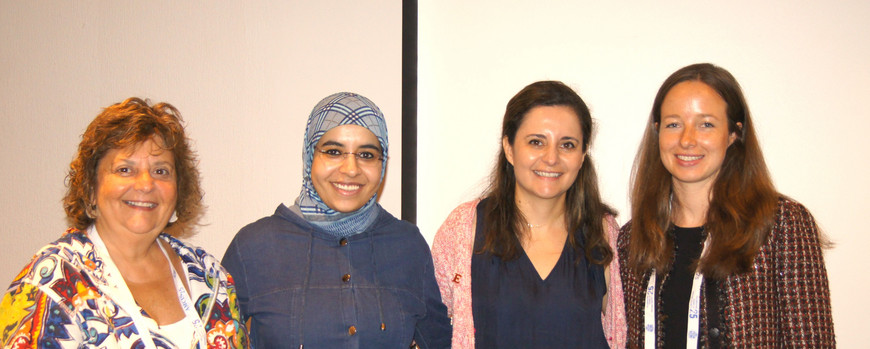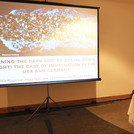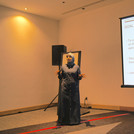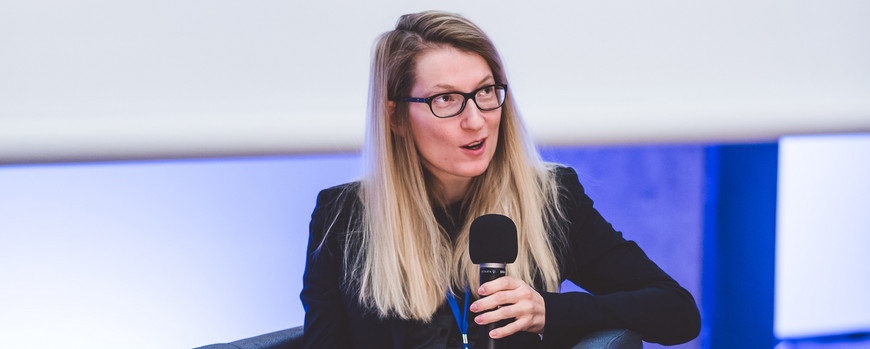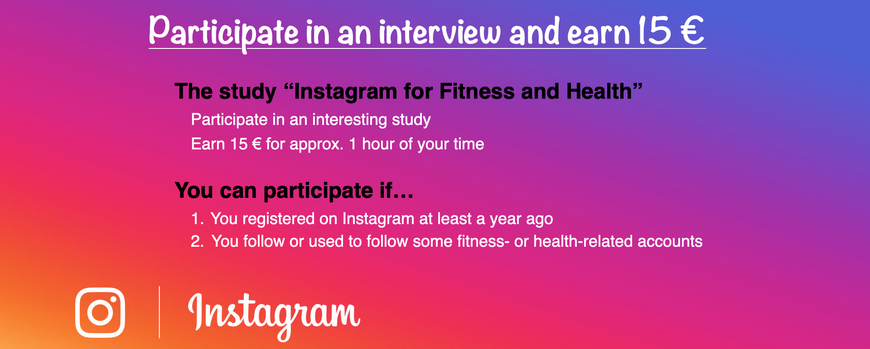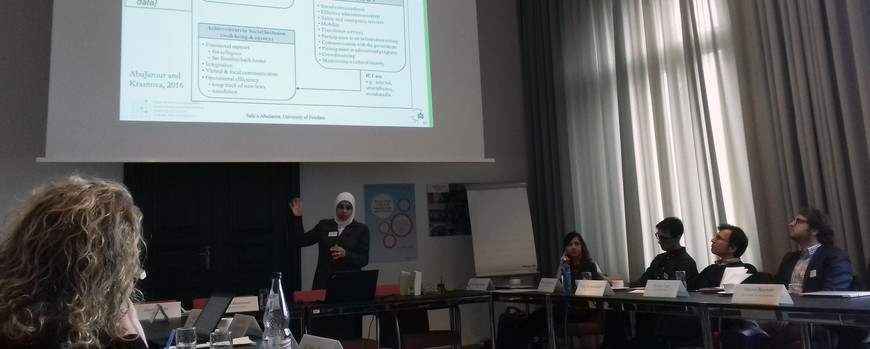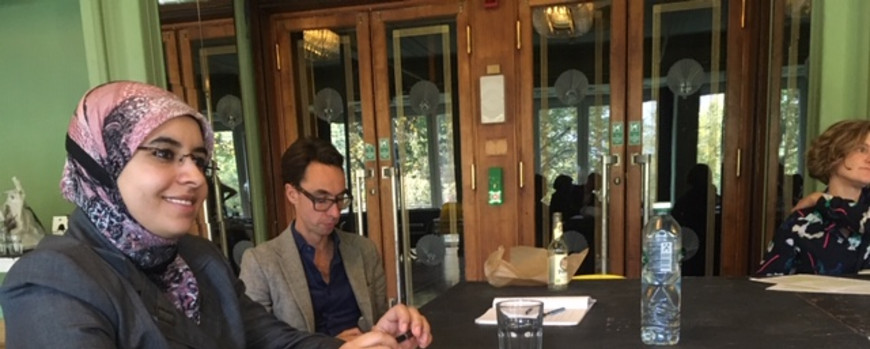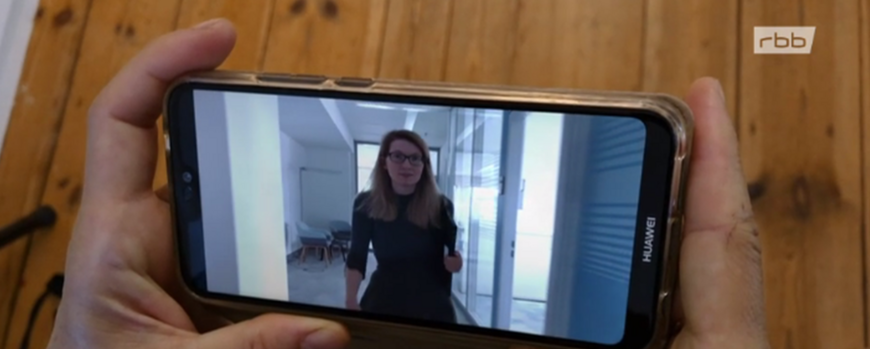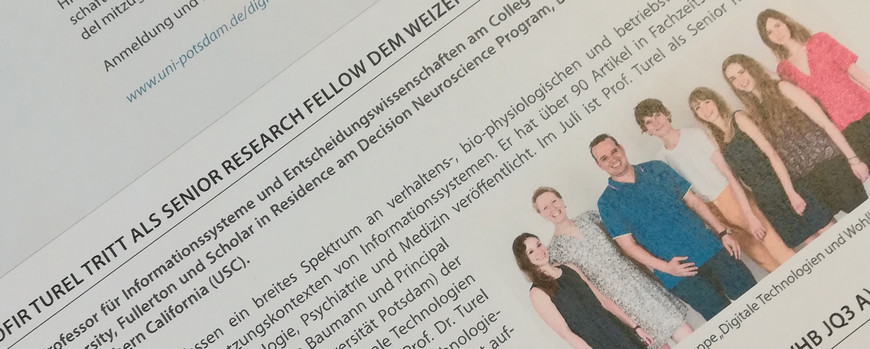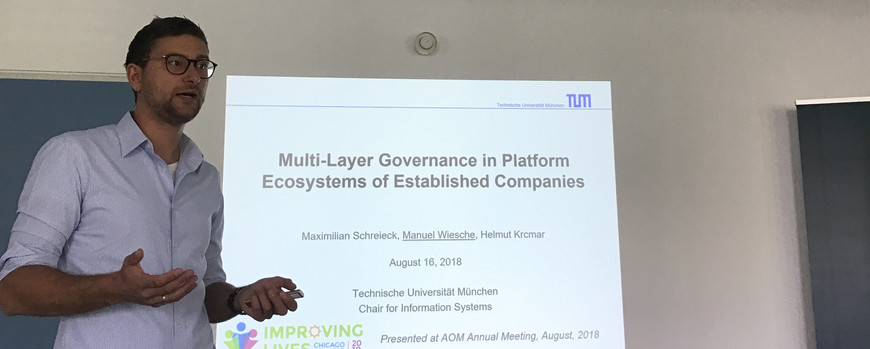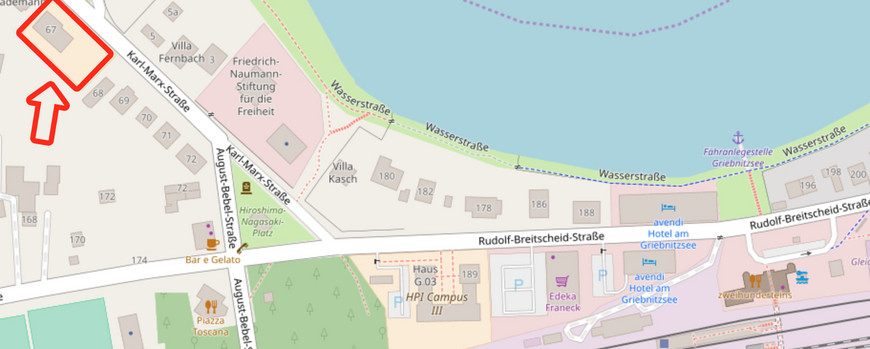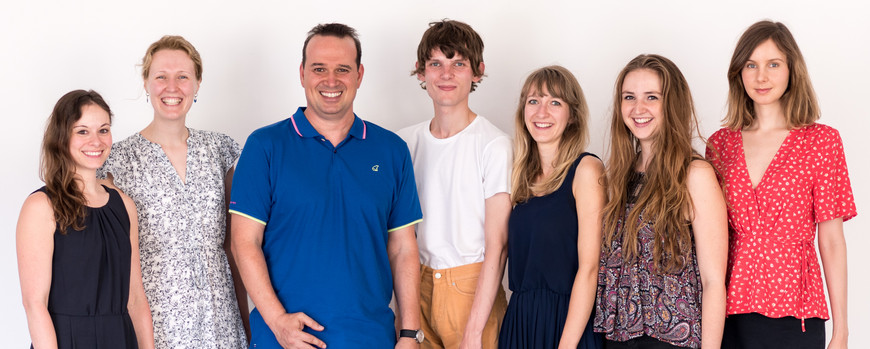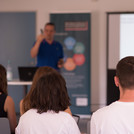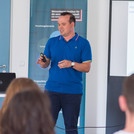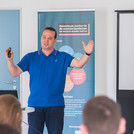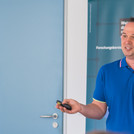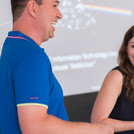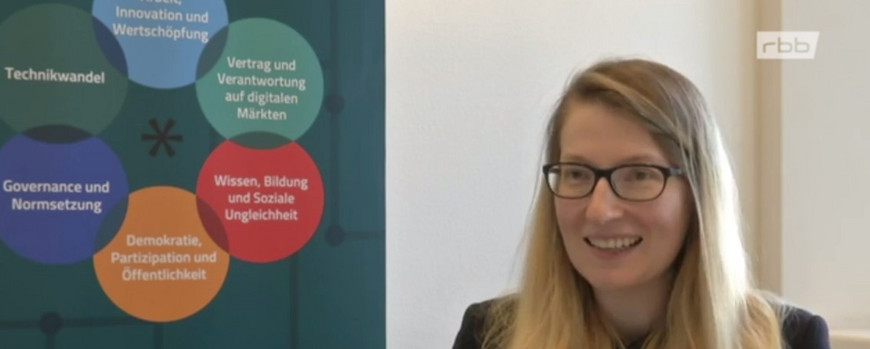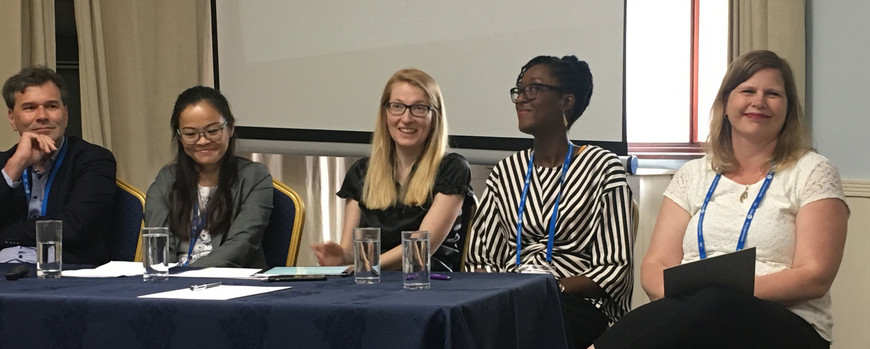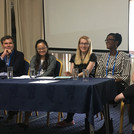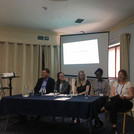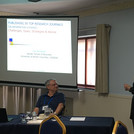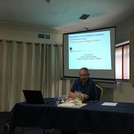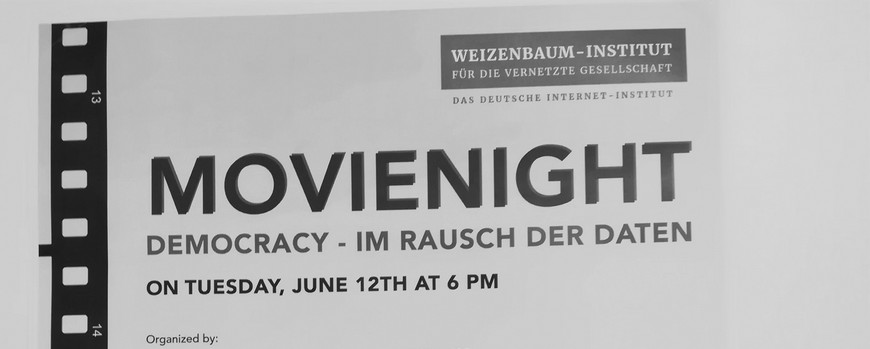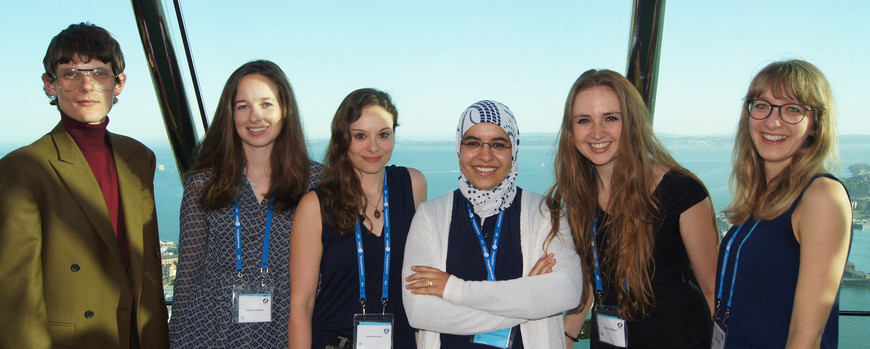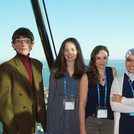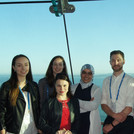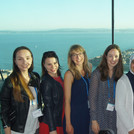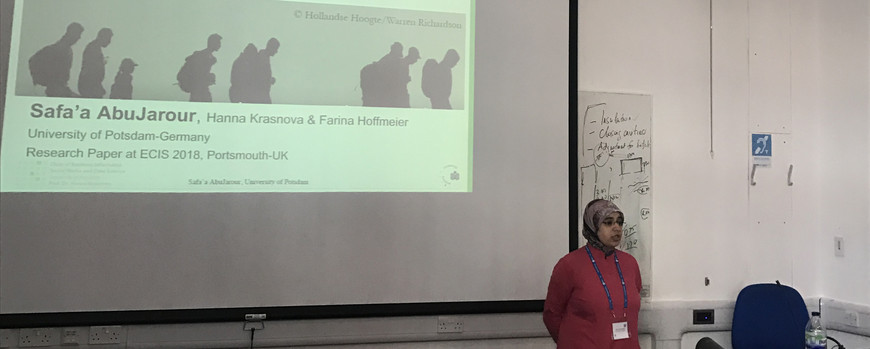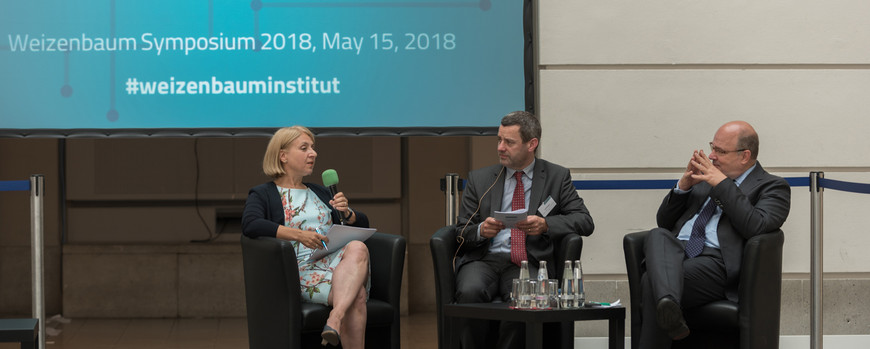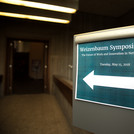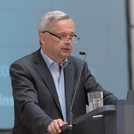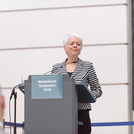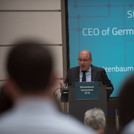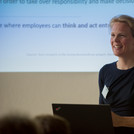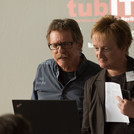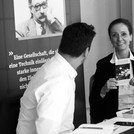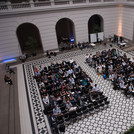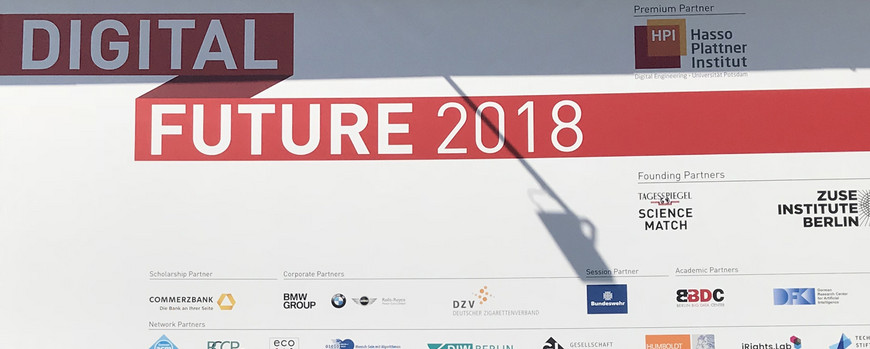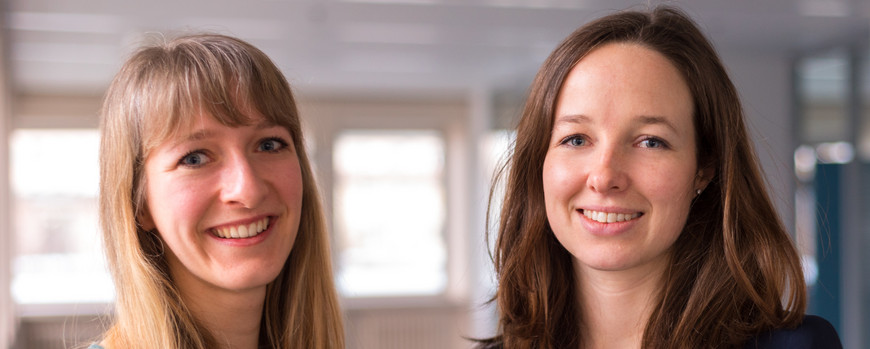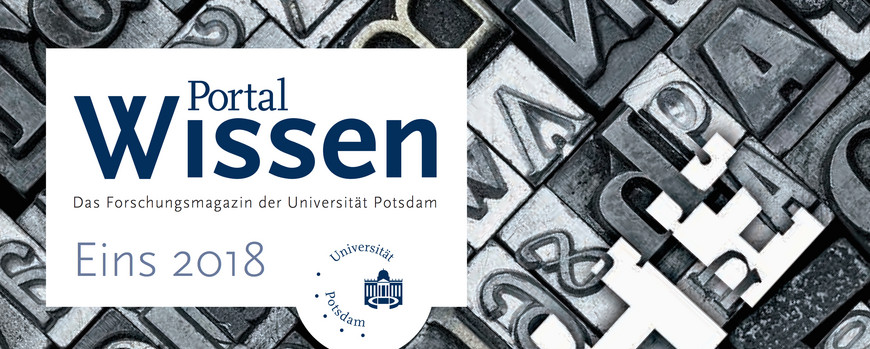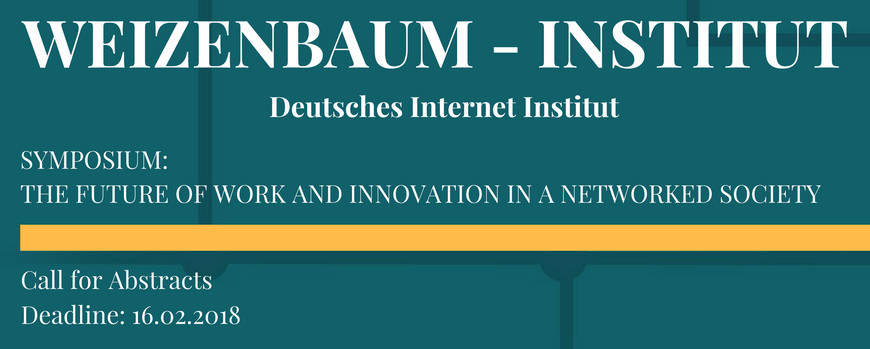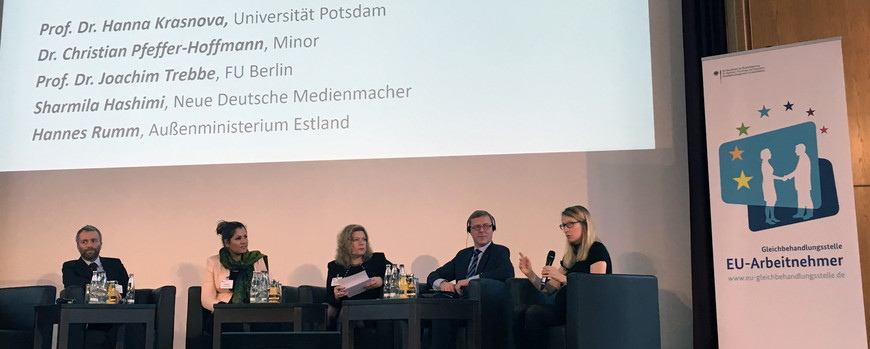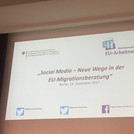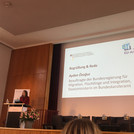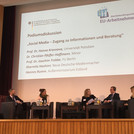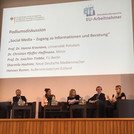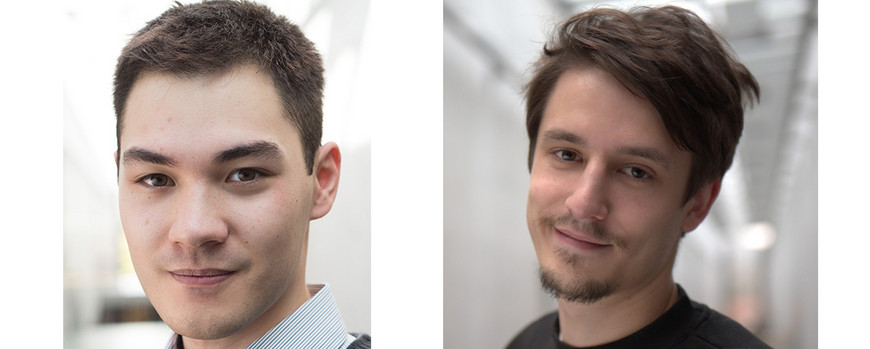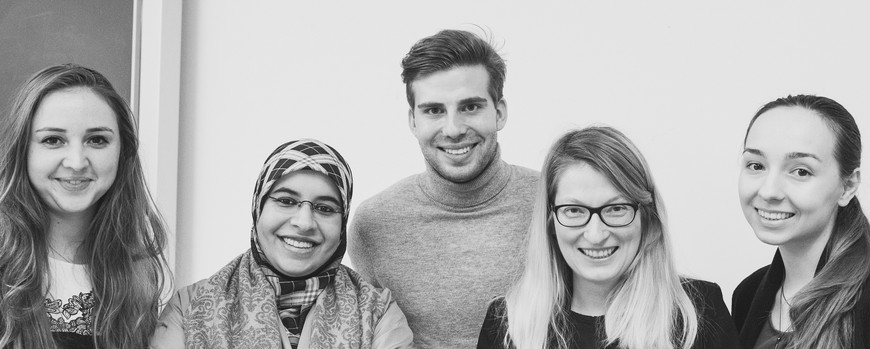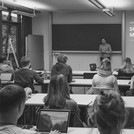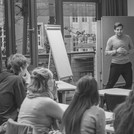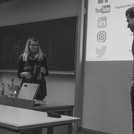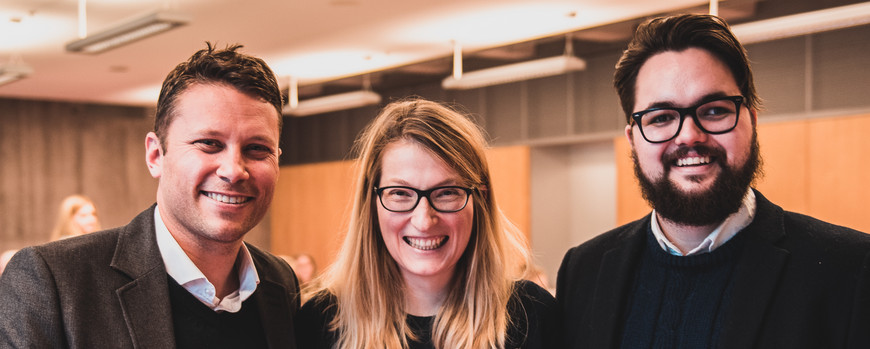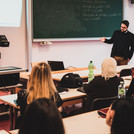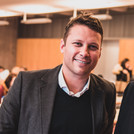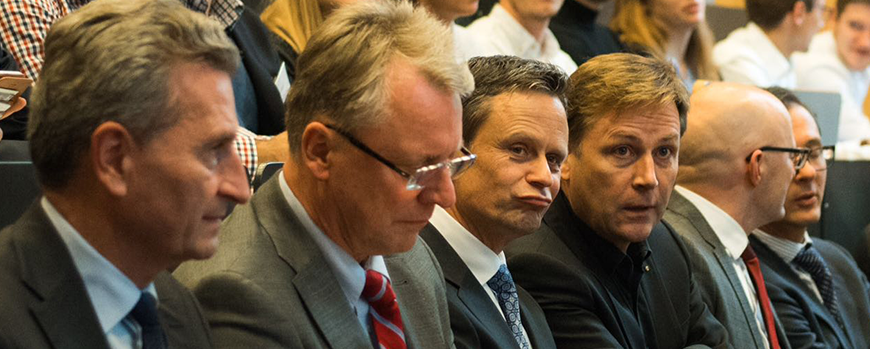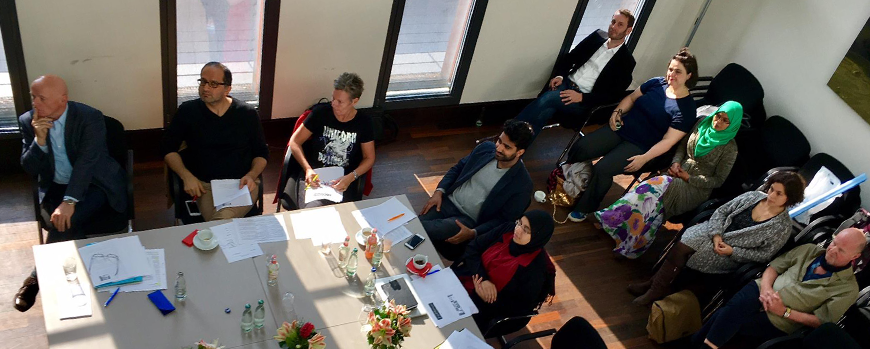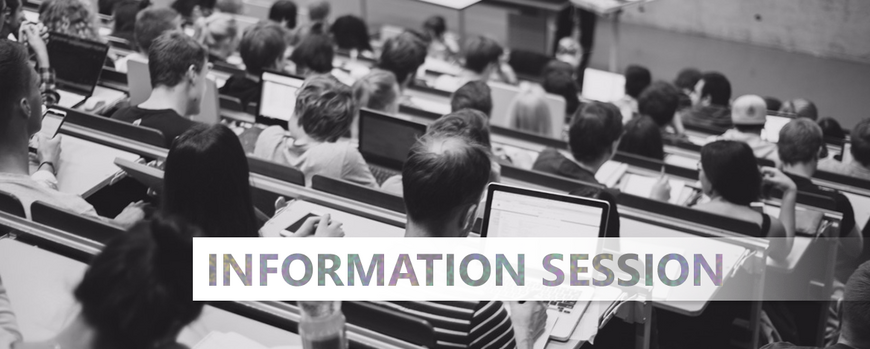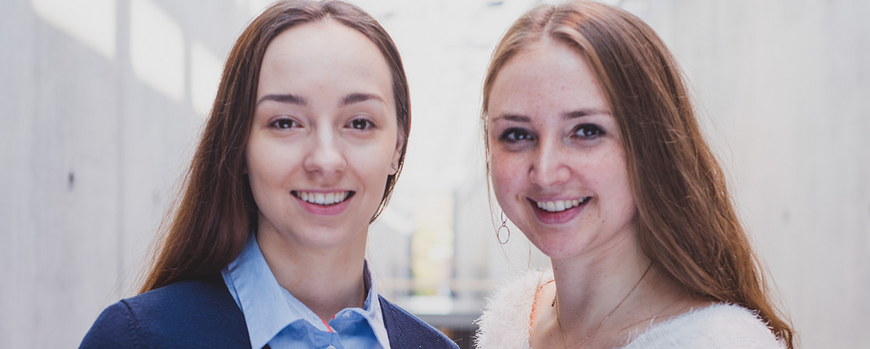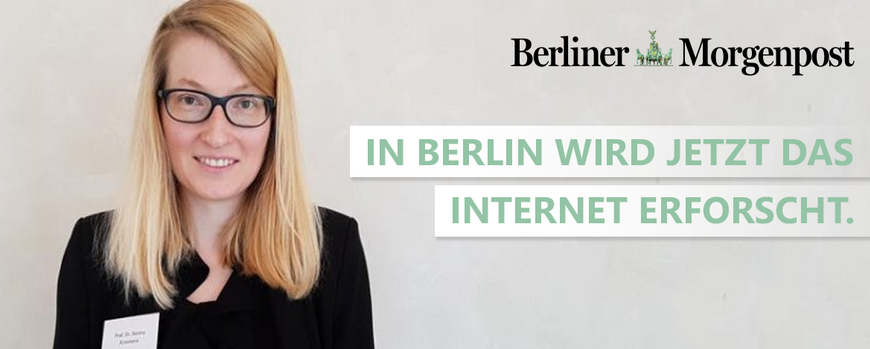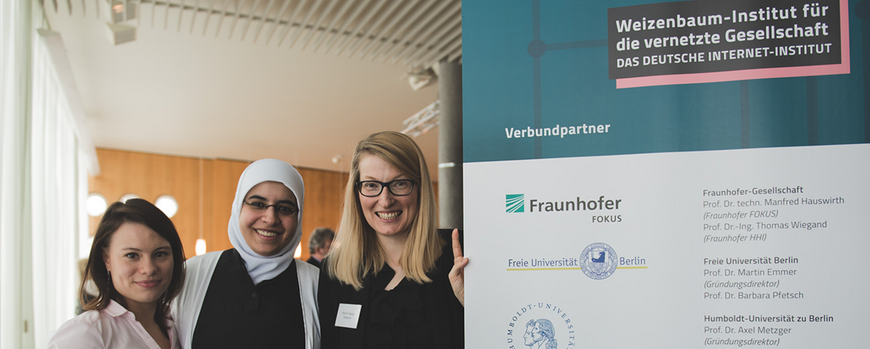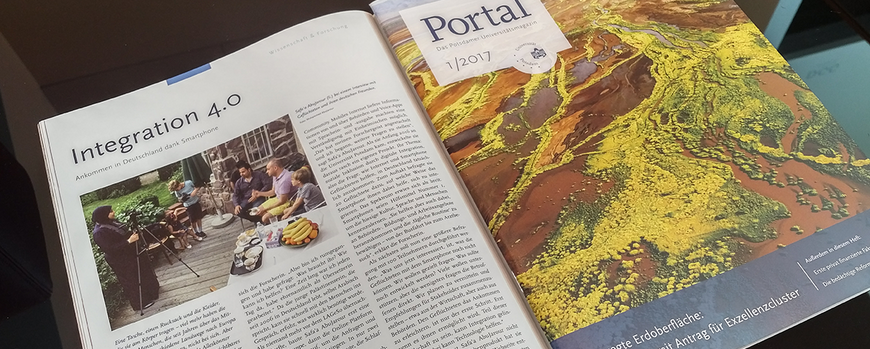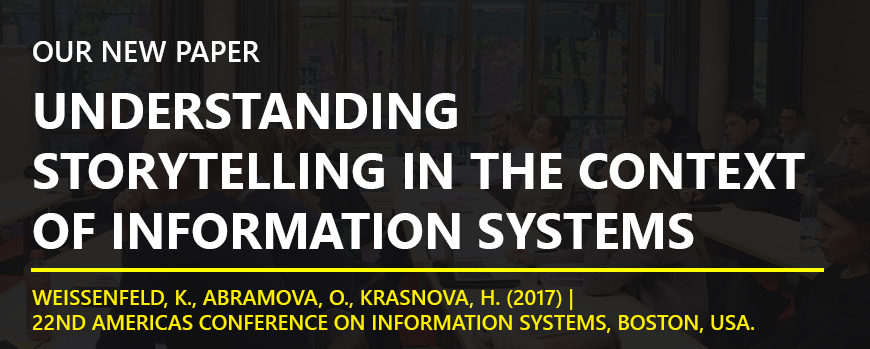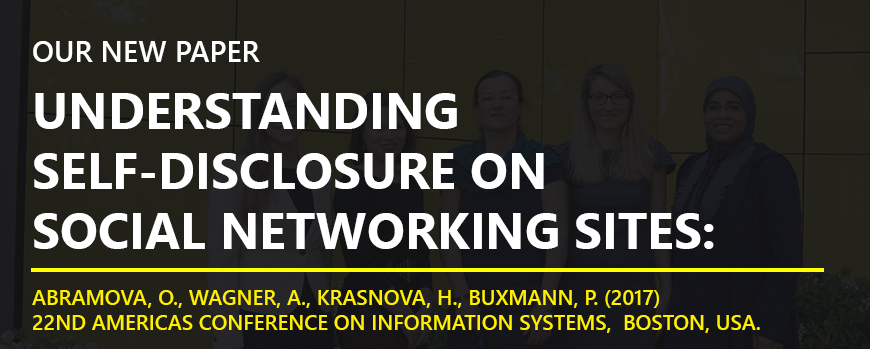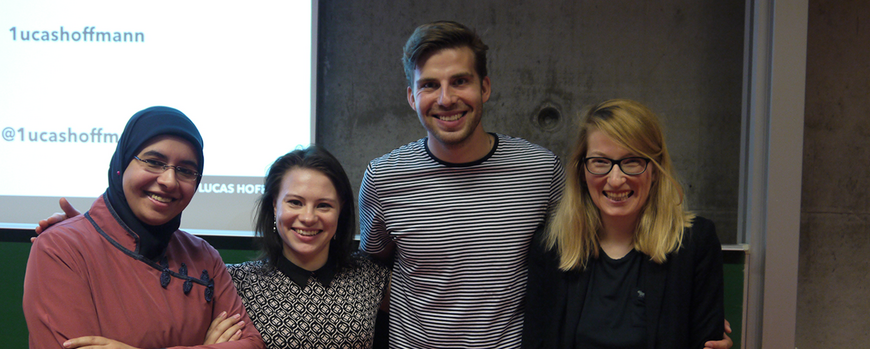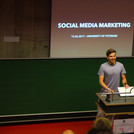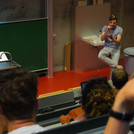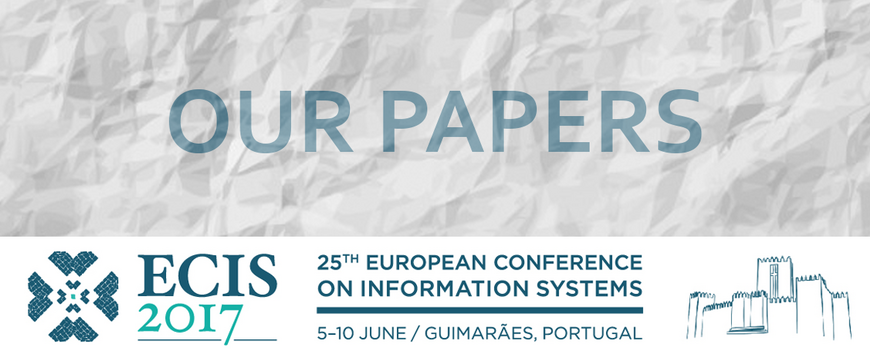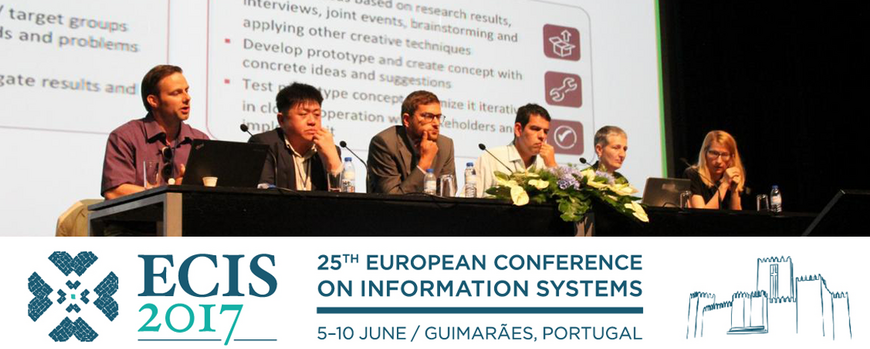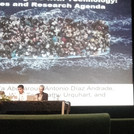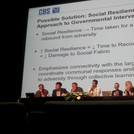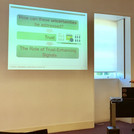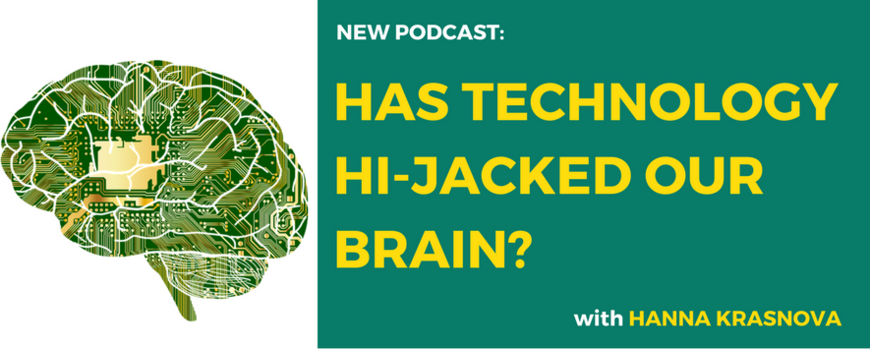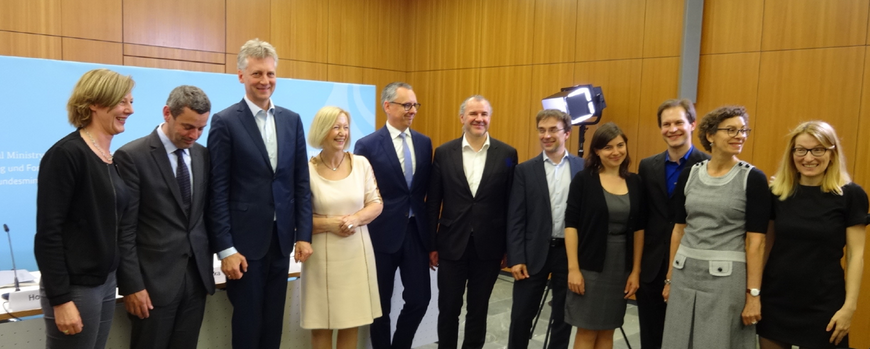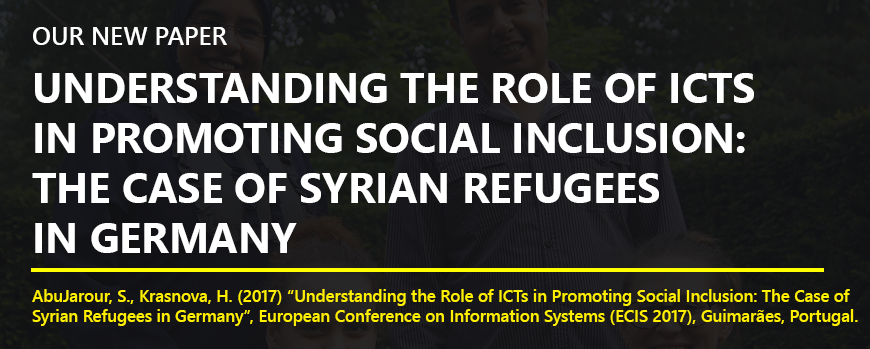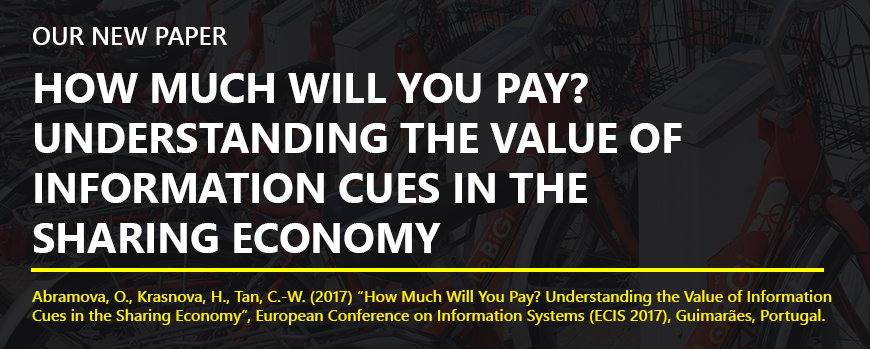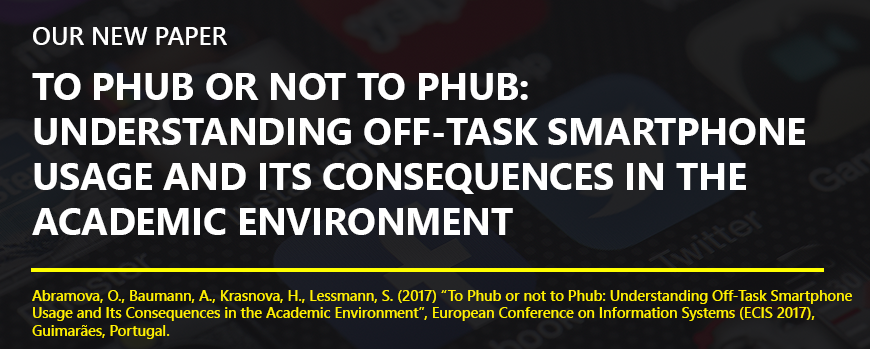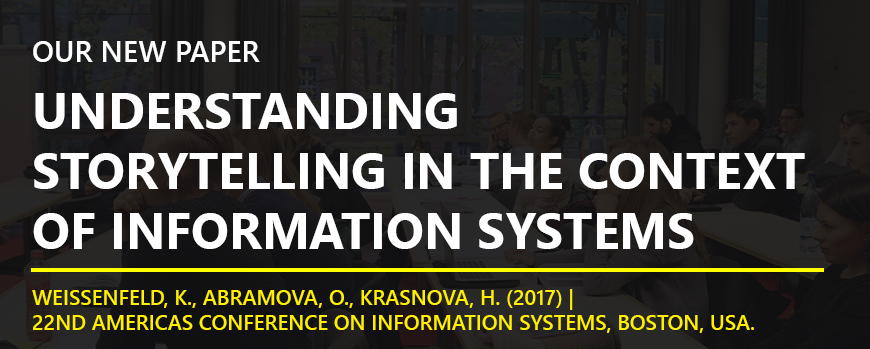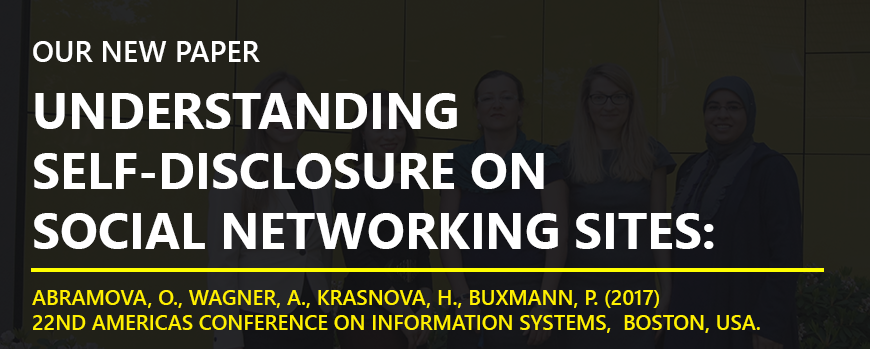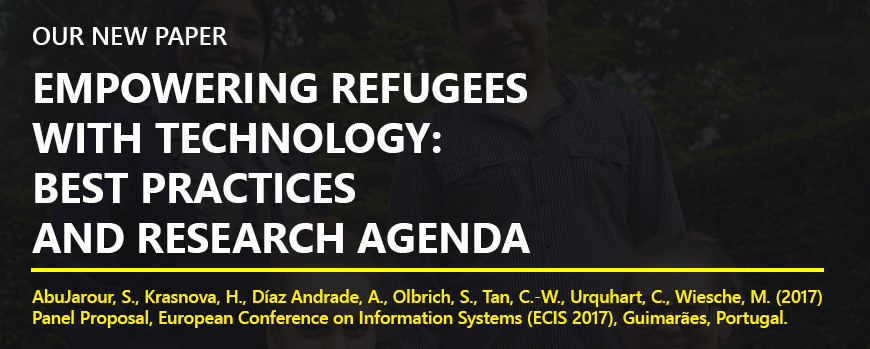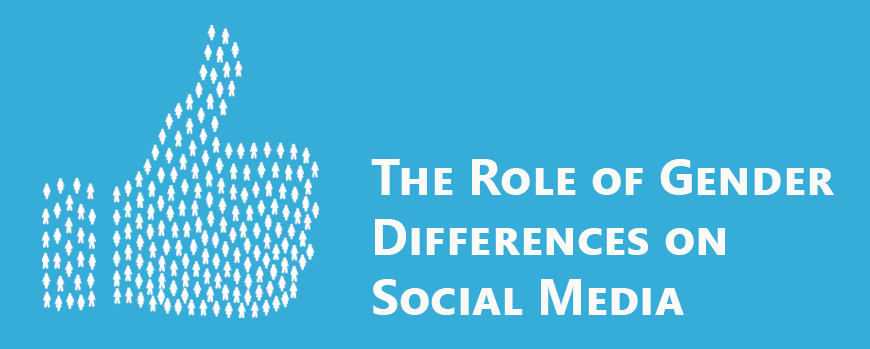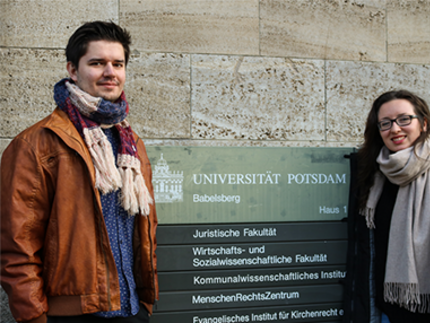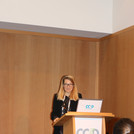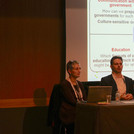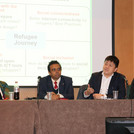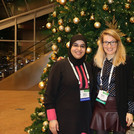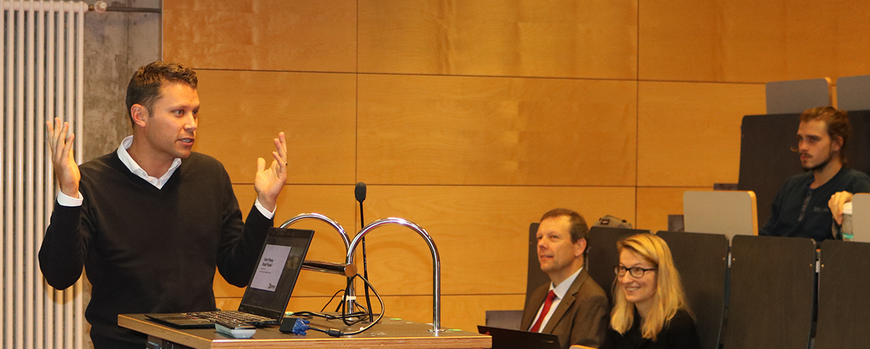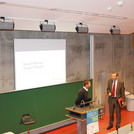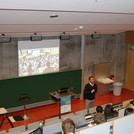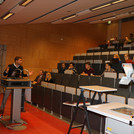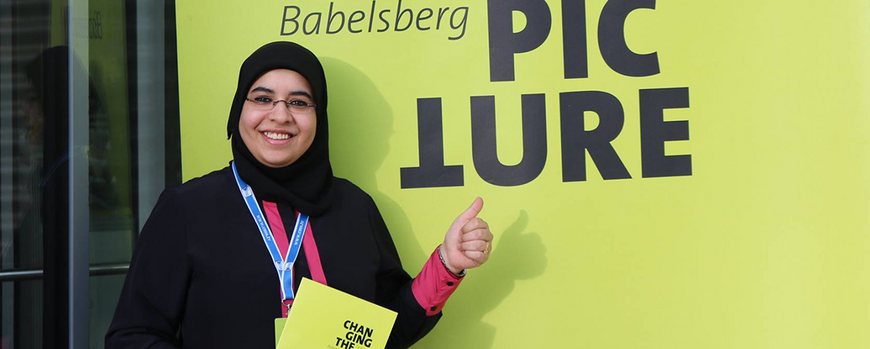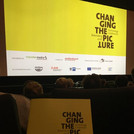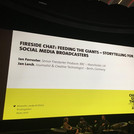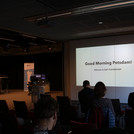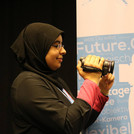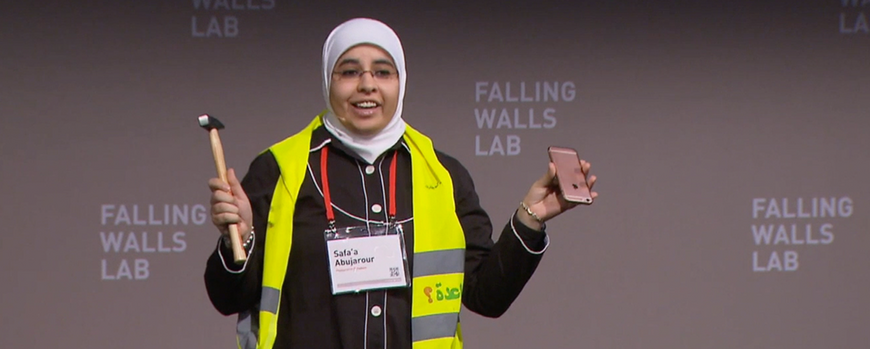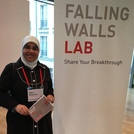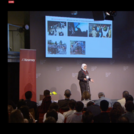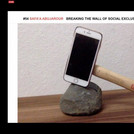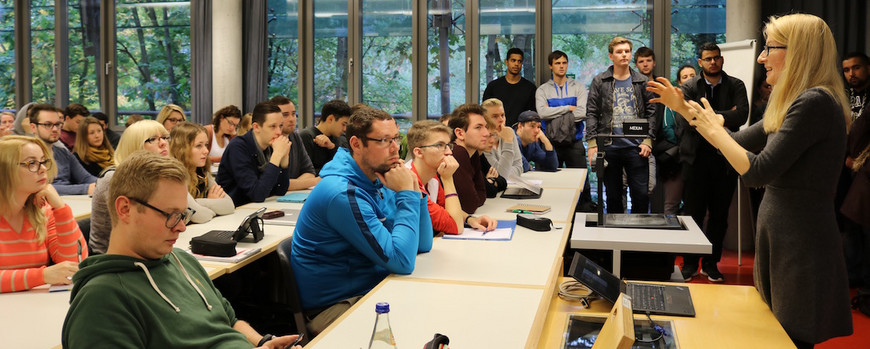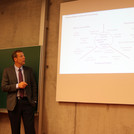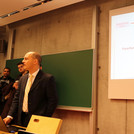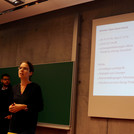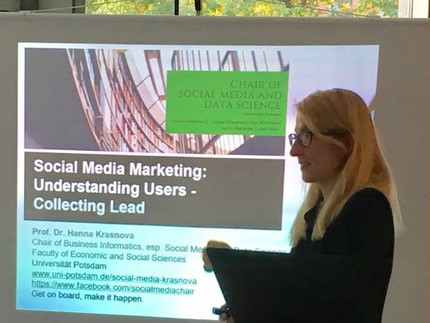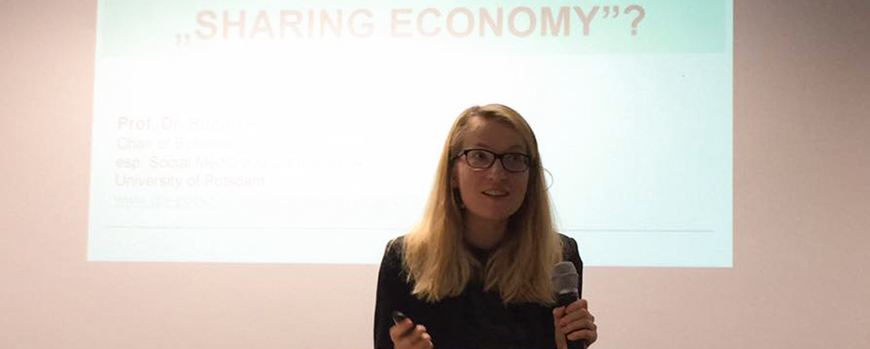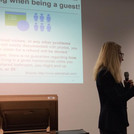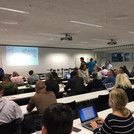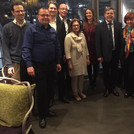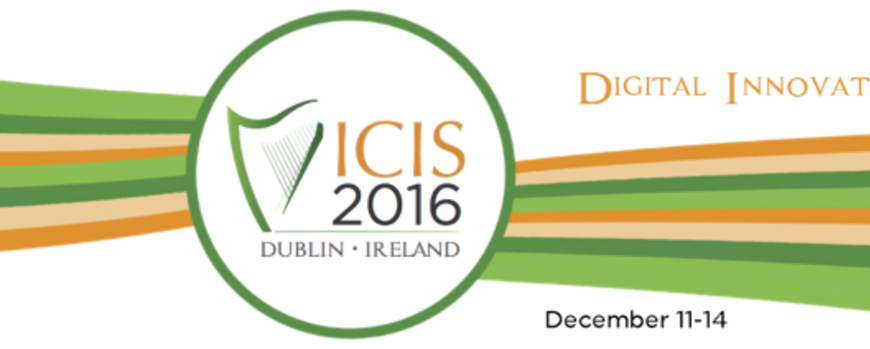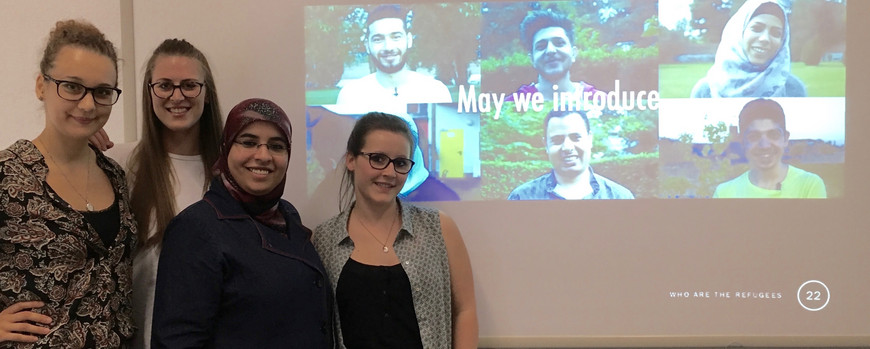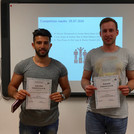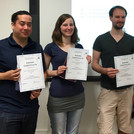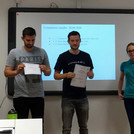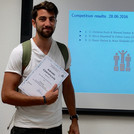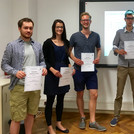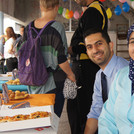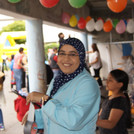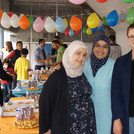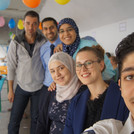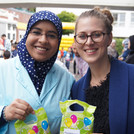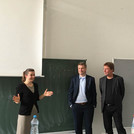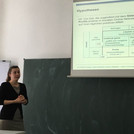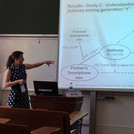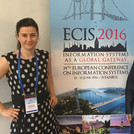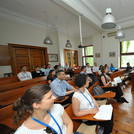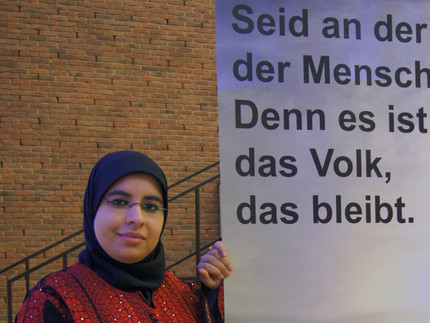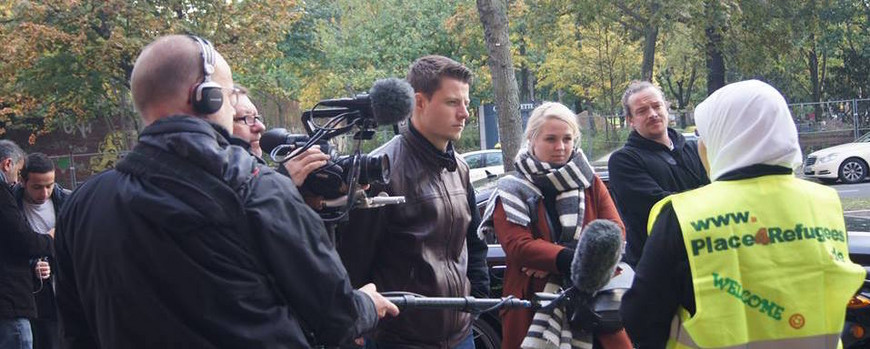News
A successful event during the 15th International Business Informatics Congress at Uni Potsdam
Thursday, March 12th, 2020
We are glad that the 15th International Business Informatics Congress (WI2020) contributed to our research community on different levels. Especially via the insightful keynotes, valuable panels, and lively discussions the took place. Moreover, parallel paper sessions were full of insightful presentations and motivated researchers, who shared their passion for research and their innovative research projects.
We would like to thank everyone who has contributed to the success of WI2020. Our thanks go specially to the conference chairs, the keynote speakers, the organization team and volunteers, and of course the attendees of the conference. Our special appreciation goes to the University of Potsdam for hosting this event.
Dr. Fenne große Deters offered a workshop "Introductory Workshop: Experimental Research in Information Systems"
Wednesday, March 11th, 2020
In the context of the 15th International Business Informatics Congress (WI 2020) that was held at the University of Potsdam, our team member Dr. Fenne große Deters offered a workshop on the topic "Introductory Workshop: Experimental Research in Information Systems".
The aim of this workshop is to provide researchers the necessary knowledge to successfully integrate experiments into their own work. The participants learn how experiments and other research methods can ideally complement each other and what importance experimental research has for causal conclusions. Moreover, the participants have the opportunity to design and discuss their own experiments during the workshop.
Research Paper Presentation during the International Business Informatics Congress in Potsdam
Monday, March 9th, 2020
During the 15th International Business Informatics Congress that took place at the University of Potsdam, Dr. Antonia Köster presented the paper “Missing Out on Life: Parental Perceptions of Children’s Mobile Technology Use”.
The paper was co-authored by: Cora Bergert, Antonia Köster, Hanna Krasnova (University of Potsdam), and Ofir Turel (California State University).
Abstract:
Mobile devices have become an integral part of everyday life due to their portability. As literature shows, technology use is not only beneficial but also has dark sides, such as addiction. Parents face the need to balance perceived benefits and risks of children’s exposure to mobile technologies. However, no study has uncovered what kind of benefits and concerns parents consider when implementing technology-related rules. We built on qualitative responses of 300 parents of children aged two to thirteen to explore concerns about, and perceived benefits of children’s smartphone and tablet usage, as well as the rules parents have developed regarding technology use. Findings point to concerns regarding children’s development, as well as benefits for both children and parents, and ultimately to new insights about mobile technology mediation. These results provide practical guidance for parents, physicians and mobile industry stakeholders, trying to ensure that children are acting responsibly with mobile technology.
Hanna Krasnova is co-chairing the 15th International Business Informatics Congress
Friday, March 6th, 2020
The chair of Social Media and Data Science, Prof. Dr. Hanna Krasnova is co-chairing chairing the 15th International Business Informatics Congress (WI 2020) to be held at the University of Potsdam, Germany.
The current developments, opportunities and challenges of digitalization will be presented and discussed at the annual conference of business informatics from 9-11th March 2020 in Potsdam.
For more information about the conference, please visit: https://wi2020.de/en/.
You can also follow the news of the conference on Twitter @WI2020DE
Final presentations of our students at Online and Social Media Marketing seminar
Wednesday, February 5th, 2020: Our students of the Seminar Online and Social Media Marketing have successfully concluded the semester with their final presentations.
The students presented an extensive overview of their practical projects, including; their achievements, created material for their social media campaigns, and lessons learned during the project time.
As part of this seminar, students were able to perform an in-depth situational analysis for a specific industry partner, including existing weaknesses, strengths, threats, and opportunities. They also developed a social media strategy for their industry partners and implemented it as part of the original social media campaign using social media channels (e.g., Facebook, YouTube, LinkedIn, Blog, Instagram).
We thank our students for their passion and motivation during the course and wish them the best in their future steps.
Olga Abramova defended her Ph.D. thesis
Thursday, January 23rd, 2020: Today, our group member, Olga Abramova, has successfully defended her Ph.D. thesis at the Technical University Darmstadt. Her dissertation is titled “ICT-enabled Connectedness: Implications for Sharing Economy and Communication Contexts” and was supervised by Prof. Dr. Peter Buxmann from the Technical University Darmstadt and Prof. Dr. Hanna Krasnova from the University of Potsdam.
Congratulations, dear Dr. Olga Abramova!
“Enjoy the moment - what do we really gain” Interview with Dr. Fenne große Deters
Friday, January 10, 2020: Our group member Dr. Fenne große Deters gave an interview to the radio station "Deutschlandfunk". Moderator Dominik Schottner and his team were wondering whether our smartphones might keep us from enjoying the moment. Dr. Fenne große Deters gave advice on how to use our smartphones more wisely and gave insights into the latest research on how interruptions due to our smartphone can impact our performance and well-being.
You can listen to the interview here (in German):
www.deutschlandfunknova.de/beitrag/im-hier-und-jetzt-leben-was-es-uns-wirklich-bringt
Paper Presentation at Hawaii International Conference on System Sciences
Friday, January 10, 2020: Our group member Olga Abramova presented her research paper titled “Does a Smile Open All Doors? Understanding the Impact of Appearance Disclosure on Accommodation Sharing Platforms” at the 53rd Hawaii International Conference on System Sciences, Maui-Hawaii.
We are glad that her paper was nominated for Best Paper Award in the Track “CL: Collaboration Systems and Technology”.
Abstract
Online photographs govern an individual’s choices across a variety of contexts. In sharing arrangements, facial appearance has been shown to affect the desire to collaborate, interest to explore a listing, and even willingness to pay for a stay. Because of the ubiquity of online images and their influence on social attitudes, it seems crucial to be able to control these aspects. The present study examines the effect of different photographic self-disclosures on the provider’s perceptions and willingness to accept a potential co-sharer. The findings from our experiment in the accommodation-sharing context suggest social attraction mediates the effect of photographic self-disclosures on willingness to host. Implications of the results for IS research and practitioners are discussed.
Citation:
Abramova O. (2020). Does a Smile Open All Doors? Understanding the Impact of Appearance Disclosure on Accommodation Sharing Platforms. Proceedings of the 53rd Hawaii International Conference on System Sciences.
Professional Development Workshop at ICIS 2019: Designing Experimental Studies by Dr. Fenne große Deters
Wednesday, December 18th, 2019: Around 35 attendees of the International Conference of Information Systems in Munich participated in the 3-hour workshop on experimental design offered by our group member Dr. Fenne große Deters. The workshop aimed to expand the methodological tool kit of researchers with no or very basic training in experimental methods. Therefore, it introduced the essentials of understanding and planning state-of-the-art experimental research both in the laboratory and the field. Participants learnt how experiments can complement other research strategies and why they are an important part of the methods ecosystem. Advantages and disadvantages of different experimental designs and common pitfalls and challenges were covered extensively. Participants were encouraged to bring their own research questions and to start designing an experiment step-by-step during the workshop. Prof. Dr. Stefan Tams supported participants in this process and helped to discuss questions that arose along the way.
A summary of the content of the workshop can be found here:
aisel.aisnet.org/icis2019/pdws/pdws/8/
Safa’a AbuJarour received the AIS Doctoral Student Service Award
Tuesday, December 17th, 2019: It is our pleasure to announce that our researcher Safa’a Abu Jarour was honored to receive the AIS Doctoral Student Service Award during the International Conference of InformationSystems (ICIS 2019) in Munich, Germany.
The AIS Doctoral Student Service Award recognizes volunteer contributions made by doctoral students toward the success of AIS conferences, journals, and programs.
Congratulations to Safa’a thanks for her contributions to the AIS community.
Paper Presentation at the International Conference on Information Systems
Tuesday, December 17th, 2019: Our group member, Hannes-Vincent Krause, has presented a full research paper titled “Keeping Up with the Joneses: Instagram Use and its Influence on Conspicuous Consumption” at the International Conference on Information Systems that took place in Munich, Germany.The paper was co-authored byHanna Krasnova; Fenne große Deters; and Annika Baumann from University of Potsdam/Weizenbaum Institute for the Networked Society together with Amina Wagner and Peter Buxmann from Technische Universität Darmstadt.
Abstract:
So far research in the area of social networking sites (SNS) has drawn surprisingly little attention to users’ conspicuous consumption (CC), even though the constant rise of younger people’s debts seems to go hand in hand with the rise of SNS. To fill this research gap, we conducted two studies based on social comparison and normative influence theory. In a preliminary study, we show that Instagram use is positively related to users’ CC. In the main study, using a sample of 283 German Instagram users, we find possible explanations for this association. While norms on Instagram seem not to account for the link between Instagram use and CC, our results suggest a mediating effect of envy. We contribute to the literature by providing insights on SNS use and CC while offering first explanations for its potentially harmful economic outcomes.
The paper could be downloaded here:
aisel.aisnet.org/icis2019/crowds_social/crowds_social/21/
Chair members participated at the Junior Faculty Workshop during the International Conference of Information Systems
Sunday, December 15th, 2019: Our group members, Dr. Annika Baumann, Dr. Fenne große Deters, and Safa’a AbuJarour, participated at the Junior Faculty Workshop that took place at the International Conference ofInformation Systems (ICIS 2019)in Munich Germany.
This one-day event was designed specifically for junior faculty to be oriented and prepared for the opportunities and challenges ahead.Our faculty members spent a day with a group of distinguished scholars, mid-career faculty who have gone through the tenure process more recently, as well as peer colleagues in order to get advice and share experiences. In particular, the overarching goals of the workshop were to provide our junior faculty members with advice on how to plan and manage the tenure process and future career, and to offer a platform for discussion and networking.
The workshop addressed various topics and related choices that tobe made on the academic journey, including publication and networking strategies, tenure preparation and career planning, work-life balance, managing co-authorships, etc. The workshop form at was very interactive which made the day fruitful and enjoyable.
Informed Consent in Times of GDPR – Talk by Our Research Fellow Ramona Schödel
Tuesday, December 3rd, 2019: Our research fellow Ramona Schödel from the LMU Munich gave an insightful talk about challenges of data protection in the context of research at the Weizenbaum Institute. After an overview of GDPR, she shared her experiences with addressing the requirements of data protections in practice drawing on insights she gained in the PhoneStudy research project, in which rich data is collected via smartphone sensing. Interesting discussions evolved around conflicting goals of the GDPR and the open science movement as well as the question whether detailed information about data protection actually enables or hinders participants to give informed consent.
Method Workshop: Systematic Reviews and Meta - Analyses by Dr. Douglas Parry
Friday, November 22, 2019: Our research groups are pleased to host the Method Workshop on Systematic Reviews and Meta-Analyses held by Dr. Douglas Parry that took place at the Weizenbaum Institute in Berlin. With an ever-increasing volume of research being produced, synthesis of existing findings in relation to a phenomenon of interest becomes an important component of the empirical cycle. In this research methods workshop, systematic reviews are introduced as an approach to comprehensively locate and synthesize research that bears on a particular question, using organized, transparent, and replicable procedures. Relevant for those familiar with systematic reviews and relative novices, the workshop aims to consider the argument for conducting systematic reviews, distinguish between narrative and systematic reviews, and outline the procedures required to perform a high-quality systematic review. Particular emphasis is placedon distinguishing between qualitative and quantitative reviews and the analytic procedures involved in each approach.
Dr. Parry is part of the Cognition and Technology Research Group (CTRG) from Stellenbosch University, South Africa. His research focusses on Socio Informatics and involves several projects concerned with the interplay of technology, cognition, and well-being. He also holds a teaching position in the under- and postgraduate Socio Informatics program.
We enjoyed the in-depth workshop and looking forward to future workshops by Dr. Parry.
Presentation at the Parliamentary Evening “Digitalisierung und Bildung. Zwischen Ohnmacht und Vision”
Wednesday, November 13, 2019: Our team member Cora Bergert gave a presentation at the Parliamentary Evening “Digitalisierung und Bildung. Zwischen Ohnmacht und Vision,” which was organized by the Weizenbaum Institute for the Networked Society. Held at the John-Lennon-Gymnasium, Berlin, the event addressed important issues regarding digitization and education: What will education look like in a networked society? Which skills are essential for teachers and students to have in a digital world and how can such skills be taught successfully? What challenges and impacts of digitalization need to be addressed in this context?
Cora Bergert shared insights in to her work on children’s and adolescents’ use of mobile technologies, such as smartphones and tablets. She vividly illustrated the important role of parents in determining the impact these technologies have on their children and the positive as well as negative consequences which may result from children using such devices.
International Journalist Delegation at the Weizenbaum Institute
Friday, November 8th, 2019: In the context of the “Falling Walls Conference”, an information tour at the invitation of the Federal Foreign Office of Germany has taken place at the Weizenbaum Insitute (The German Internet Institute) on November 8, 2019. 15 international journalists from the field of science and research visited the Weizenbaum Institute in Berlin. The aim of the visit was to give the journalists the opportunity to gain insights into the work of the institute and to establish contacts with scientists in Germany. The delegation trip was organized by the Federal Ministry of Foreign Affairs in Germany and it was in the context of the Berlin Science Week and Falling Walls Conference.
Prof. Hanna Krasnova introduced the institute and shared some insights on the research groups. Along with other researchers at the Weizenbaum institutes, two of our researchers at the University of Potsdam presented our research projects during the International Journalist Delegation. Safa'a AbuJarour presented to topic of Digital Integration in the Context of Migration, and Dr. Annika Baumann presented the topic on the Impact of Digital Technologies on our Well-Being.
Providing Training in Research Methods at the Weizenbaum Institute
Wednesday, October 23rd, 2019: Interested researchers at the Weizenbaum Institute were invited to participate in a workshop on the design of experimental studies. Our team member Dr. Fenne große Deters shared her expertise on the topic. She introduced the essentials of understanding and planning state-of-the-art experimental research both in the laboratory and the field and discussed advantages and disadvantages of different experimental designs as well as common pitfalls and challenges. Participants directly applied their acquired knowledge by designing an experiment step-by-step and problems and questions that had arisen along the way were addressed extensively.
Participating at the Workshop: Mixed Method Research by Prof. Viswanath Venkatesh
Monday, October 7th, 2019: From 4th to 7th October 2019, our researchers Safa’a AbuJarour and Antonia Köster joined 25 participants from all over Germany who gathered in Augsburg at the Institute for Digitization Research e.V. for the Mixed Methods Research Workshop by Professor Viswanath Venkatesh, Ph.D.
Mixed methods research is an approach that combines quantitative and qualitative research methods in the same research inquiry to gain insights. It is often acknowledged that each method has its strengths and weaknesses. Mixed methods research can tap into the best of both worlds.
In the workshop, the instructor Prof. Viswanath Venkatesh, a distinguished professor from the University of Arkansas, focused on various aspects of conducting mixed methods research ranging from purpose to appropriateness to development of meta-inferences to assessment of quality of meta-inferences.
Safa’a AbuJarour has been Nominated for the 2019 AIS Early Career Award
Friday, October 4th, 2019: We are proud to announce that our research associate Safa’a AbuJarour has been nominated for the 2019 AIS Early Career Award by the Association of Information Systems.
This award recognizes individuals in the early stages of their careers who have already made outstanding research, teaching, and/or service contributions to the field of information systems. See: aisnet.org/page/EarlyCareerAward.
The final decision is made by December 2019. Congratulations to Safa’a and we wish her the best in future steps.
Panel Discussion at the American Conference of Information Systems in Cancun, Mexico
Monday, August 26st, 2019: At the Americas Conference on Information Systems (AMCIS 2019) that was held in Cancun, Mexico, our team members introduced a panel discussion on the topic “Turning the Dark Side of Social Media Bright! The Case of Immigration in the USA and Germany”.
Safa’a AbuJaorur, how has initially submitted the panel proposal to the conference, moderated the panel discussion. Honorable panelists related to the topic joined the panel discussion, including Jane Fedorowicz from Bentley University, Antonia Köster from the Weizenbaum Institute, and Haya Ajjan from Elon University.
The panel discussion tackles the challenges of integration and social inclusion that have been on top of the agenda for many political leaders in Europe and the USA. The Information Systems community has invested significant effort in researching immigrants and especially refugees, seeking to better understand how to facilitate social inclusion processes. This panel looks at multiple viewpoints on the topic of immigration, specifically showing how technology can both support and prevent immigrants from succeeding in their quest. It further aims to stimulate a thoughtful and dynamic discussion on best practices and recommendations to enhance the discipline’s impact on alleviating the challenges that occur for immigrants in their host countries.
Movie Night on the 11th June
After a lecture from 12:15 – 15:45 about Psychology of Digital Users | Privacy Regulation the Movie Night will take place from 16:00-19:00 at the Weizenbaum Institute for the Networked Society, Hardenbergstr 32 (4 Minutes from S-Bahn Zoologischer Garten).
Hanna Krasnova participated in the Welcome Ceremony for DAAD scholarship holders 2018
Wednesday, November 21st, 2018: Our team member and chair holder Prof. Dr. Hanna Krasnova participated in the Welcome Ceremony for this year’s DAAD scholarship holders. The German Academic Exchange Service or DAAD (German: Deutscher Akademischer Austauschdienst), established in 1925, is the largest German support organization in the field of international academic co-operation, and it’s no surprise that their Welcome Ceremony for scholarship holders 2018 in Berlin and Potsdam was honored by the presence of representatives of the Federal Foreign Office and Berlin and Potsdam’s different educational institutes.
After the official welcome by representatives of the TU Berlin, DAAD and the Federal Foreign Office, a panel discussion on “Open Science – Open Societies: Weltweit vernetzt für globale Herausforderungen” (English: “Interlinked worldwide for global challenges”) took place. There, Hanna Krasnova shared her insights along Jürgen Christof (TU Universitätsbibliothek), Daniel Gietz (Verlag Walter de Gruyter) and Dr. Jana Hoffmann (Museum für Naturkunde Berlin).
We wish all the scholarship holders the best of luck and every success in their future endeavors! And who knows, maybe we’ll be seeing some of you in our bachelor or master courses… :)
For more information on DAAD, please visit.
Andreas Weigend from the Digitalrat on “Data for the People”
Monday, October 1, 2018: Today, Andreas Weigend visited the Weizenbaum-Institut for his talk on “Data for the People”. Being Amazon’s former chief scientist and having worked with global clients including Alibaba, he’s an expert on big data, consumer behavior and social-mobile technologies, with an interest in people and the data they create. Currently, he’s also a member of the recently founded Digitalrat, a panel of experts with the task to advise the Federal Government on digitizing and shaping the digital transformation of society.
After having been presented by Uni Potsdam’s president Prof. Oliver Günther, both sat down to converse about different aspects of the relationships between data and people, such as identity, the value of data, social credit systems, and the tasks of the recently founded Digitalrat. Naturally, several questions came up, i.e.: Are we the things we share, or are we the things we don’t share? Around 70 of our staff members were following this conversation, and later participated by questions and further inquiries. Thank you so much for coming all the way and sharing your insights with us!
For more information on Andreas Weigend, please click here.
For more information on the Digitalrat, please click here.
For more information on the Weizenbaum-Institut, please click here.
We’re looking for participants for our study „Instagram for Fitness and Health“!
Friday, November 16, 2018: Dear All, our team members are looking for participants for their study on “Instagram for Fitness and Health”! All participants receive 15€ for their participation – the interview will be hold at Uni Potsdam, Campus Griebnitzsee, and will take around an (1) hour.
You can participate if…
(1) You registered on Instagram at least a year ago
(2) You follow or used to follow some fitness- or health-related accounts
If you’re interested in taking part in our study, please contact Margarita Gladkaya (gladkayauuni-potsdampde).
We’re looking forward to seeing you at our interview!
Safa’a AbuJarour participated in the WZB’s Workshop “Social Contact Metaketa”, focused on Horizon 2020
Saturday, October 20, 2018: Today, our team member Safa’a AbuJarour gave a presentation on her research about “Digital integration: The role of technology in the social inclusion of refugees in Germany” at the Workshop “Social Contact Metaketa”, organized by WZB Berlin Social Science Center.
The workshop focused on the upcoming Horizon 2020 call, “Addressing the challenge of migrant integration through ICT-enabled solutions”, and brought together national and international academics and practitioners to discuss the workshop’s H2020 proposal: a social contact metaketa – a multi-site coordinated study with common interventions and measures to help identify important conditions under which contact theory's predictions hold in real-world settings of migrant-native relations. More explicitly, the participants came together to sharpen their theoretical focus, dive deeply into crucial research design choices for a project of this size and scope, come to an agreement about collaboration with partners, and begin the grant-writing process. Our team thanks the WZB Berlin Social Science Center for organizing and hosting such an interesting event.
For more information on the Workshop “Social Contact Metaketa”, please visit www.wzb.eu/de/veranstaltungen/workshop-social-contact-metaketaFor more information on the WZB Berlin Social Science Center, please visit www.wzb.eu/en.
Safa’a AbuJarour talking about Digital Integration at Volksbühne Berlin
Monday, October 8, 2018: Today, our team member Safa’a AbuJarour participated as a guest lecturer in “Integrations: Four Sketches on Migratory Society - A trans-disciplinary Workshop convened by Dr. Itamar Mann”, a seminar organized by Volksbühne Berlin within the scope of its School of Disobedience. There, she shared her thoughts and insights on “Digital Integration” and presented her current research results, addressing refugee participation through social media and the tech market, followed by an open discussion with the participants.
Volksbühne Berlin’s School of Disobedience is an experimental format that tests new ways of independent knowledge production in the 21st century. The seminar itself is designed to reflect and discuss some of the major basic challenges and opportunities that increased migration presents for collective political action in the present – a great opportunity to begin an ongoing conversation on these issues in a way that combines perspectives from Social Sciences and Humanities with perspectives from those studying emerging technologies.
For more information on her guest lecture, please visit
For more information on Volksbühne Berlin’s School of Disobedience, please visit
Hanna talking about the use of Smartphones in rbb show “Himmel und Erde”
Monday, September 17, 2018: Short time ago, Hanna Krasnova was being interviewed by RBB's Christoph Heymann about her research on the use of smartphones and its consequences for students and for families.
The report called "Leben mit dem Smartphone" (German for "Life with the Smartphone") was featured in the rbb show "Himmel und Erde" (German for "Heaven and Earth"), and we invite you to have a look at her interview (starting minute 12): https://www.rbb-online.de/himmelunderde/reportagen/leben-mit-dem-smartphone.html
For more information on rbb show “Himmel und Erde”, please visit
Chair for Social Media and Data Science featured in WI-Info, Autumn 2018
Tuesday, August 28, 2018: Our Chair for Social Media and Data Science was featured in the new autumn edition of WI-Info – the newsletter published regularly by Prof. Dr.-Ing.Norbert Gronau’s Chair of Business Informatics, esp. Processes and Systems. We were invited to participate, and were happy to contribute with two short news items of our own team and their daily doings.
This time: (1) Prof. Dr. Ofir Turel joining an UP-led group “Digital Technologies and Well-Being” as a Senior Research Fellow at the Weizenbaum Institute, and (2) a paper accepted at the European Journal of Information Systems (VHB JQ3 A).
We kindly invite you to have a look for yourselves, to access the newsletter click here
Research Fellow Talk of Dr. Manuel Wiesche on Multi-Layer Governance in Platform Ecosystems
Wednesday, August 8, 2018: Today, Dr. Manuel Wiesche came all the way from Munich to visit us at the Weizenbaum Institute in Berlin and tell our colleagues and us all about Multi-Layer Governance in Platform Ecosystems – a topic he’s well aware of, being a postdoctoral researcher at the Chair for Information Systems, Technische Universität München (TUM), focused on project management, platform ecosystems, digital service innovation, and qualitative research methods.
Listening to his insights was really interesting, and we’re hoping to be able to receive him again, soon! Meanwhile, we invite you to have a look at his abstract he was presenting:
Abstract: In recent years, established companies across different industries have launched platform ecosystems. By collaborating with numerous third-party developers, these companies seek to benefit from innovative solutions created outside of their organizations. To establish fruitful collaboration with third-party developers, they apply platform governance. However, established companies face a high degree of internal and external complexity such as heterogeneous product portfolios, fragmented markets, and existing partner networks. This makes platform governance a more challenging endeavor for established companies than for digital-native companies that create platform ecosystems on the green field. Literature on platform governance so far is based on a core-periphery model that considers relationships between the platform owner and third-party developers but does not capture the complexity of platform ecosystems implemented by established companies. Therefore, we conduct a multiple case study based on four established companies from different industries. We show that these companies apply multi-layer governance to manage the collaboration among (1) internal business units, (2) core partners, and (3) peripheral partners. Thereby, internal and external complexity affects the way companies govern these three groups. Our work enhances literature on platform governance by detailing the core-periphery model and proposing complexity as antecedent for platform governance.
For more information on Dr. Manuel Wiesche, please click here
For more information on the Weizenbaum Institute, please click here
The chair has moved to Karl-Marx-Straße 67
Dear all, our Chair has moved to Karl-Marx-Straße 67.
We apologize for the inconvenience.
From California to Berlin: Prof. Dr. Ofir Turel
Monday, August 6, 2018: Last week, our team received a very nice visit from California: Prof. Dr. Ofir Turel from California State University, Fullerton, came all the way to Berlin to be our guest at the Weizenbaum-Institute for the Networked Society! Dr. Turel is a Professor of Information Systems and Decision Sciences at the College of Business and Economics, California State University, and a Scholar in Residence at the Decision Neuroscience Program, Department of Psychology at the University of Southern California (USC).
His research interests include a broad range of behavioral, bio-physiological and managerial issues in various information systems use contexts, and we were very pleased to invite our colleagues to the Weizenbaum Brown Bag Coffee Talk, which took place on Thursday, July 26, and included Dr. Turel’s Research Fellow Talk. Right after our very own team members’ contributions, Dr. Turel shared with us his insights on “The “Dark Side” of Information Technology Use: Neural Basis of Facebook “Addiction”” as a technology addiction researcher.
Dear Dr. Turel, thank you so much for your visit and your contribution, we hope to see you back in Berlin soon!
For more information on Prof. Dr. Ofir Turel, please visit
For more information on the Weizenbaum-Institute for the Networked Society, please visit
Our team contributed to rbb’s contribution “Kinderfotos für die Welt”
Thursday, July 19, 2018: Nowadays, it’s common to share aspects of everyday life on social media channels such as Facebook, Twitter, Snapchat or Instagram. Posts show a variety of topics, ranging from pets, food, hobbies or motivational pictures - no wonder then that parents like to photograph their children and brag on them online.
Rbb, the institution under public law (national broadcaster) for the German states of Berlin and Brandenburg, situated in Berlin and Potsdam, asked themselves: “Where does this need to publicly share its private life with everyone come from?” and dedicated a whole broadcast named “Children's photos for the world” to finding the answer to this question. They interviewed young insta-mom Sandra from Köpenick, Berlin, who has over 30,000 followers on Instagram, and asked her all about her passion for sharing her baby’s pictures. And what better than to consult our very own Hanna Krasnova, Head of the Chair for Social Media and Data Science at Universität Potsdam and Principal Investigator of the Weizenbaum-Institute for the Networked Society, to get theoretic insights on the “#instamoms” phenomena? But see for yourselves!
We were thrilled to be able to help and share some of our insights, and can’t wait for the next questions the team of rbb will come up with!
To see the video, please visit
For more information on rbb, please visit
For more information on Weizenbaum-Institute, please visit
Hanna Krasnova and Peter Winter organized the Doctoral Consortium at ECIS 2018
Sunday, June 24, 2018: Our team member Hanna Krasnova and our estimated colleague Robert Winter from Universität St. Gallen, Switzerland, teamed up some months ago to start organizing what then turned out to be the Doctoral Consortium at the European Conference of Information Systems 2018, that took place in Portsmouth, UK. Running from Saturday to Sunday, the Doctoral Consortium was the opening act for the conference, and a great opportunity for doctoral students currently working on dissertations in the area of Information Systems to share their work and receive feedback in a collegial and affirmative environment.
We were really impressed with all their work, and are curious to see what future holds for our participants. Maybe we’ll see some again next year? We definitely hope so!
For more information on ECIS 2018, please visit.
For more information on the Doctoral Consortium 2018, please visit.
Movie night in the Weizenbaum Institute for the Networked Society: Democracy - Im Rausch der Daten
Tuesday, May 12, 2018: Today at the Weizenbaum Institut for the Networked Society, around 50 of our students and colleagues came together for the first movie night! Our colleagues screened “Democracy – Im Rausch der Daten”, a German documentary about the European Union legislation by David Bernet from the year 2015.
Sharing cookies, chips and popcorn, we accompanied European Parliament member Jan Philipp Albrecht and the Vice-President of the European Commission and Commissioner for Justice, Fundamental Rights and Citizenship, Viviane Reding, on their fight for greater data protection. After the screening, we had the opportunity to talk to Ralf Bendrath via Skype - Ralf is the senior policy advisor to Jan Philipp Albrecht, with a focus on digital civil liberties, including privacy and security. Our students and colleagues really seized the moment, asking on the biggest challenges while negotiating, the role of the German government, on Ralf’s first observations and insights on the law being implemented, and so on.
We thank our colleagues from our chair and from the research groups “Data as means of payment” and “Shifts in norm setting” for organizing this event, Ralf Bendrath for answering our questions, and hope to be able to participate in some more opportunities like this one in the future!
For more information on the Weizenbaum Institute for the Networked Society, click here.
For more information on the movie “Democracy - Im Rausch der Daten”, click here.
Our team participated in the European Conference of Information Systems 2018 in Portsmouth, UK
Thursday, June 28, 2018: These days, the European Conference of Information Systems 2018 took place in Portsmouth, UK, and we were happy to be able to participate again, together with our team members from the Chair for Business Informatics, esp. Social Media and Data Science, and the Weizenbaum Institute for the Networked Society. The theme of the conference this year was “Beyond Digitization – Facets of Socio-Technical Change” - so interesting! ECIS is one of the leading European conferences in these topics, and we were grateful to be able to participate, connect with other participants and as such get some fantastic new insights for our work. Thank you so much for having us, we’re looking forward to ECIS 2019!
For more information on ECIS 2018, please visit here
For more information on our team members, please visit our team section here
Presentation of our chair members’ research papers at ECIS 2018
Thursday, June 28, 2018: During the course of the conference, some of our team members and some of our other team members’ estimeed coauthors, presented their research papers at the European Conference for Information Systems 2018, that took place in Portsmouth, UK.
Our very own Safa’a AbuJarour introduced us to her research paper “ICT as an Enabler: Understanding the Role of Online Communication in the Social Inclusion of Syrian Refugees in Germany” (you can find this and the following references at the end of this news item).
Other papers accepted to the ECIS 2018 conference and presented by our esteemed coauthors were: Olga Abramova and Hanna Krasnova’s paper on the role of perspective-taking on social networking sites called “When You Share, You Should Care: Examining the Role of Perspective-Taking on Social Networking Sites”, and Annika Baumann’s paper on crowdturfing on Instagram named “ Crowdturfing on Instagram - The Influence of Profile Characteristics on the Engagement of Others”.
We’re grateful for the opportunity to present and discuss our work, and are looking forward to next year’s conference!
References:
- AbuJarour, S., Krasnova, H., Hoffmeier, F. (2018) ICT as an Enabler: Understanding the Role of Online Communication in the Social Inclusion of Syrian Refugees in Germany, Twenty-Sixth European Conference on Information Systems (ECIS2018), Portsmouth, UK, 2018
- Wagner, A., Abramova, O., Krasnova, H., Buxmann, P. (2018) When You Share, You Should Care: Examining the Role of Perspective-Taking on Social Networking Sites, Proceedings of the European Conference on Information Systems (ECIS2018), Portsmouth, UK, 2018
- Voronin, G., Baumann, A., Lessmann, S. (2018) Crowdturfing on Instagram - The Influence of Profile Characteristics on the Engagement of Others, Twenty-Sixth European Conference on Information Systems (ECIS2018), Portsmouth, UK, 2018
For more information on ECIS 2018, please visit here
For more information on our research, please visit here
First Weizenbaum Symposium on “The Future of Work and Innovation in a Networked Society”
Tuesday, May 15, 2018 - The first Weizenbaum Symposium on “The Future of Work and Innovation in a Networked Society” took place today in Berlin. Linking up with the theme “Working Worlds of the Future” of the Science Year 2018, it offered the opportunity to bring together different disciplinary perspectives on the transformation of the working world and of innovation models in the digital society.
In e.g. panel sessions such as “Digital entrepreneurship and work”, “Platforms and crowds” and “The bright and the dark sides of digital work”, participants could identify and discuss the key challenges for the creation of a self-determined, creative and innovative society. The symposium brought together almost 200 experts from science, politics and business to exchange views on the latest trends and research results. Our chair members were present, as well, and gained some great new insights. We’re looking forward to the next edition!
For more information on the Weizenbaum Symposium, please visit here
Our team at the Digital Future Science Match 2018
Monday, May 15, 2018: Today, the fourth Digital Future Science Match took place in Berlin, and several of our team members from Weizenbaum Institute for the Networked Society were there to witness, along with about 1,000 other participants.
The Digital Future Science Match is an international computer science conference held in Berlin every spring, honouring the invention of the Z3 computer by Konrad Zuse in 1941. This year, it was a joint effort of Verlag Der Tagesspiegel and six renowned scientific institutions - Zuse Institute Berlin, German Research Center for Artificial Intelligence, Berlin Big Data Center, Einstein Center Digital Future, as well as our colleagues from Hasso Plattner Institute and our Weizenbaum Institute for the Networked Society.
It brought together experts from science, industry and politics on topics such as Big Data, Digital Society, Industrie 4.0 and many more, in different formats - among them sessions, short plenary presentations, and of course the breaks and expert lunch. This year, over 50 leading academics shared their insights, and we’re thankful that we had the privilege to be there and could take it all in. We’re looking forward to attend again next year!
For more information on the Digital Future Science Match 2018, please click here
We welcome our new PhD candidates and Postdocs!
Thursday, February 15, 2018: In the process of establishing the new Weizenbaum-Institute for the Networked Society, we are again gaining new team members. Please welcome with us our PhD candidate Cora Berger and our Postdoc Antonia Köster!
The Weizenbaum-Institute is investigating the fundamental changes in society in the course of digitization. Cora and Antonia are joining Hanna Krasnova’s research group “Digital Integration”, part of the wider research area “Knowledge, Education, and Social Inequality”. As such, they are located in the institute’s offices in Berlin. We hope you’ll have a great time with us and the other research teams, and are looking forward to your visits to Campus Griebnitzsee!
For more information on Cora, please visit
For more information on Antonia, please visit
For more information on the DII, please visit
Hanna Krasnova featured in Portal Wissen 1/2018
Wednesday, January 31, 2018: At the beginning of 2018, the research magazine "Portal Wissen" of the University of Potsdam published a contribution by Prof. Dr. Hanna Krasnova on the impact of digital communication channels on our everyday lives.
Under the title "schau! mich! an!" (in English: “look! at! me!”) Prof. Dr. Hanna Krasnova answers questions about different aspects and effects the use of new communication channels has on her teaching, and social relationships and well-being of people in general. But look! for! yourselves!
To access the article, please visit
Call for Abstracts for the Weizenbaum Symposium on "The Future of Work and Innovation in a Networked Society"
Friday, February 2, 2018: Less than four months away from the symposium the Weizenbaum Institute for the Networked Society organizes on the subject of “The Future of Work and Innovation in a Networked Society”, we’d like to remind you again of the possibility to turn in abstracts for contributions. They must be submitted as a PDF file by February 16, with submission feedback given by March 16, while the conference itself will take place on May 15, 2018.
The aim of the symposium is to bring together different disciplinary perspectives (e.g., from communication and social science, legal studies, computer science, economics science and engineering science) on the transformation of the working world and of innovation models in the digital society, and to identify and discuss the key challenges for the creation of a self-determined, creative and innovative society.
Just to give you some ideas, thematic areas could be:
- Skill change, education and learning in the digitalized world of work;
- Platform economy, gig economy, sharing economy
- Social media and online communication at work
- Socio-technical systems perspective on introducing digital technologies at work
- Data-based business models and the transformation of industrial structures
- The “dark sides“ of work in the digital society: stress, overload, surveillance
We’re looking forward to your insights and conclusions!
For more information regarding the papers and the symposium itself, please visit
New team members arrived!
Monday, January 15, 2018: In cooperation with the new Weizenbaum Institute, our team is expanding: this month, we welcomed our new PhD candidates Katharina Baum and Hannes-Vincent Krause, as well as our new Postdoc Annika Baumann. Welcome everybody, happy to have you here with us! The three of them are joining Hanna Krasnova’s research group regarding “Digital Technologies and Well-Being”, dedicated to investigating positive consequences as well as dangers that digital technologies such as social media and apps may contain for one’s own well-being.
Unfortunately for us at Campus Griebnitzsee, we’re not going to see that much of our exciting new team members as they’re mostly going to hang around in the new Weizenbaum Institute’s building, researching and discussing among the other teams. We’re still looking forward to your sporadic visits and are really keen to hear everything about your thrilling insights!
For more information on Katharina, please visit
For more information on Hannes, please visit
For more information on Annika, please visit
For more information on the Weizenbaum Institut, please visit
Prof. Dr. Hanna Krasnova at the Annual Conference on "Social Media - New Paths in EU Migration Advice"
Thursday, December 14, 2017: Today, Prof. Dr. Hanna Krasnova was at the Annual Conference of the Office for the Equal Treatment of EU Workers. The topic was “Social Media - New Paths in EU Migration Advice”, and we’re excited that she was invited to give a keynote speech on “Social Media for Migrant Integration: The Case of Syrian Refugees" as well as to participate in the panel discussion that took part on the first day of the conference.
The panel was called “Social media - Access to information and consultation” and consisted of Prof. Dr. Krasnova, Dr. Christian Pfeffer-Hoffmann (Minor), Prof. Dr. Joachim Trebbe (FU Berlin), Sharmila Hashimi (Handbook Germany, Neue Deutsche Medienmacher) and Hannes Rumm (Estonian Ministry of Foreign Affairs). Together, they shared their valuable insights with each other and the audience.
The Conference itself was organized by the Federal Government Commissioner for Migration, Refugees and Integration. It was an interesting opportunity to participate and gain knowledge from experts all around Europe.
Thank you for having us! For more information on the Office for the Equal Treatment of EU Workers, please visit.
Welcome our new student assistants Jan and Max!
Monday, January 8, 2018: During this winter term, we welcomed two new members to our team: say hello to Jan Kopankiewicz and Max Töpfer! Jan and Max are participating in the new Weizenbaum Institute for the Networked Society, and we as Chair for Social Media and Data Science from the University of Potsdam are happy to be collaborating with both of them in some cross-institutional issues from now on. We're sure you'll see them around, either at Campus Griebnitzsee or the Weizenbaum Institute! For more information, have a look at our student assistants section.
For more information on the Weizenbaum Institute for the Networked Society, please visit here
Second guest lecture by Social Media strategist Lucas Hoffmann
Tuesday, December 12, 2017: Today, Social Media strategist Lucas Hoffmann came all the way to Potsdam again, to tell our students all about Online and Social Media Marketing. Same as last time, when he came to share his insights with us several months ago, it was really interesting to listen to his lecture. Lucas has plenty of experience in the field, and can explain concepts and correlations by referring to really interesting examples.
Again this time, the lecture was followed by a Q&A session where our students used the opportunity to ask Lucas for his professional opinion and advice on several different issues. On behalf of our Chair we would like to thank Lucas for visiting the University of Potsdam again, and are looking forward to future collaboration!
For more information about Lucas, please visit him on:
Facebook, click here.
or on his homepage, click here.
Guest lecture by Dr. Daniel le Roux and Douglas Parry about “The State of Research Concerning the Relationship between Media Multitasking and Cognition”
Monday, November 20, 2017: It was our pleasure to welcome Dr. Daniel le Roux and Douglas Parry, both from the Cognition and Technology Research Group from Stellenbosch University, South Africa. Dr. Daniel le Roux and Douglas Parry shared with us and our students their insights on the state of research concerning media multitasking and cognition, with special emphasis on different categories of hypothesis that have emerged on the basis of recent empirical findings, and their own critiques regarding those conclusions. So interesting!
For Dr. Daniel le Roux, it was his second trip to Potsdam: last year, he visited us and presented his research on the topic “Smart Phones and Academic Performance”. In Stellenbosch University, he teaches Business Analysis and Information Systems Modelling, and is also the head of Department of Information Science’s Cognition and Technology Research Group, where they conduct research projects concerning the interplay between human cognition and emerging digital technologies.
Douglas Parry is part of the Cognition and Technology Research Group (CTRG), focusing on the psychology of technology - researching new media, distraction, and attention management. He is also currently holding a faculty position teaching and supervising within the undergraduate and postgraduate Socio Informatics programs. For Douglas, it was his first visit to Potsdam, and we hope he enjoyed it, and will be back!
We want to thank both for granting us and especially our students this interesting opportunity, and hope to welcome them again soon in the future!
For more information about the Cognition and Technology Research Group, please visit here.
For Dr. Daniel le Roux’s research profile, please visit here.
For Douglas Parry’s personal site, please visit here.
First German Master Program in Business Informatics and Digital Transformation inaugurated
Monday, October 23, 2017: Digital transformation and its significance for Business Informatics are at the center of the new master program inaugurated at the University of Potsdam. It also includes our Chair’s focus on Social Media, and is the first master program of this kind in Germany.
Today we celebrated its inauguration with representatives from the political, economic and scientific sectors. European Commissioner for Budget and Human Resources and Keynote-Speaker Günther Oettinger as well as representatives of the Brandenburg state government welcomed our first master students. This was followed by a lecture by Cevat Yerli (CEO of the Video game and software developer Crytek) on Virtual Reality, and a discussion by Dr. Bernd Welz (Chief Knowledge Officer of SAP), Prof. Dr. Christoph Meinerl (CEO of the Hasso Plattner Institute) and Prof. Dr. Key Pouttchi (SAP Professor of Business Informatics and Digitalization, University of Potsdam) on how universities should train their students on Digital Transformation.
We thank everyone for their presence and look forward to the future cooperation in the implementation of this exciting new project!
For more information on the program, click here.
Safa’a AbuJarour as member of the Selection Committee for the Anawati Innovation Award 2017
Sunday, October 15, 2017: The Georges Anawati Foundation has nominated our research associate Safa'a AbuJarour as a member of the Selection Committee for the Anawati Innovation Award 2017.
Founded in 2000, the foundation aims to promote the encounter of people from Christian and Muslim cultures in Germany while supporting initiatives that sustainably intensify interreligious and intercultural dialogue and promote mutual respect and understanding.
With the new project 'Anawati Innovation Award', the foundation is breaking new ground. They want to support social innovation with the concept of seed-funding. In a one-year funding program, the award winner receives financial support, has access to leadership training and is advised by experts. The promotion starts on 1 January 2018 and runs for 12 months.
Finalists were selected that presented themselves in a one-day selection process of the selection committee. It took place in the premises of the Studienstiftung des deutschen Volkes in Berlin.
We also thank Safa'a AbuJarour for her representation of our chair in this selection committee.
For more information on the Georges Anawati Foundation, please visit here.
Chair for Business Informatics held information session for students
Monday, October 16, 2017: Today, the Chair for Business Informatics and its different specializations held its traditional information session where students could learn all about the specialized chairs and their course offers. Representing our Chair for Social Media and Data Science, Hanna Krasnova presented our team members and teaching program, and invited everybody to get on board.
Having learned from previous semesters, we decided to hold the session at one of our lecture halls instead of a seminar room. But – fortunately or unfortunately, we honestly just can’t decide how to feel about it! – this time, again, the room ended up being fully packed. Have a look at the picture and see for yourselves. Dear students, we’re thrilled and hope to see some of you again in our lectures and seminars!
For more information on our course offers, please visit our teaching section.
We welcome our new PhD candidates!
Monday, October 2, 2017: Our team has two new members: Jana Gundlach and Margarita Gladkaya join us as our new PhD candidates. While Jana is interested in Digital Integration, Open Education and Connectivity, Margarita focusses on the impact of SNSs on well-being, Health Economics, Big Data and Applied Econometrics. Both, aside from cooperating with the new German Internet Institute, are already very much involved in preparing tutorials and supervising seminars – so you’ll definitely see them around! If you want to have a chat with them or just have a look at their office hours, you can use the links provided on their profiles in the team section.
Jana and Margarita, we’re looking forward to be working with you!
Our Chair featured on Berliner Morgenpost
Thursday, September 21, 2017: Our chair member and principal investigator of the new Weizenbaum Institute for the Networked Society, Hanna Krasnova, was being interviewed by the Berlin newspaper Berliner Morgenpost.
There, being in charge of the Research Group “Digital Technologies and Well-Being”, she gave information on its possible research topics and interests, e.g. finding new insights regarding how virtual social platforms should be designed so that they could be used to ease elderly people’s isolation.
For the entire interview, please follow the link.
Official Opening of the Weizenbaum Institute for the Networked Society
Thursday, September 21, 2017: The Weizenbaum Institute for the Networked Society: German Internet Institute has officially started its activities. Based on the joint proposal of seven institutions from Berlin and Brandenburg – with the University of Potsdam being one of them – the Institute was opened by the Federal Minister of Education and Research Prof. Dr. Johanna Wanka in the presence of Berlin’s governing mayor Michael Müller. With Hanna Krasnova being a principal investigator, our chair is looking forward to the upcoming research and exchange of insights together with colleagues from other universities and research institutions!
For more information on the Weizenbaum Insitute, please visit here.
If you want to relive the inauguration, please visit here.
Safa’a AbuJarour in Potsdam University’s magazine “Portal”
Monday, July 10, 2017: The University magazine “Portal” reports what is happening at the UP – it contains information on important developments and relevant events, presents interesting initiatives and projects, portrays employees and students, and provides insights into the different international activities and research at the university. In its last issue (Portal 1/2017) they put their spotlight on our Chair member Safa’a AbuJarour and her involvement with refugees.
In his article “Integration 4.0”, Matthias Zimmermann describes Safa’a AbuJarour’s voluntary work with refugees and her academic research at the Chair for Social Media and Data Science on the role of technology in the social inclusion of refugees in Germany. He also maps out different additional outcomes – initiatives like place4refugees.de and student projects like “Who are the refugees” – and future activities. But read for yourselves!
You can find the article following this link: https://www.uni-potsdam.de/fileadmin01/projects/up-entdecken/docs/portal/aktuell/Portal_01_2017_web_korrektur.pdf
For more information on place4refugees.de, please visit http://place4refugees.de.
For more information on “Who are the refugees”, please visit https://whoaretherefugees.wordpress.com.
For more information on our other current student projects, please visit https://www.uni-potsdam.de/de/social-media-krasnova/teaching/students-projects.html.
AMCIS 2017 - New Papers have been accepted
Tuesday, May 2, 2017: Our Chair member Olga Abramova had two papers accepted for the 23rd Americas Conference on Information Systems (AMCIS 2017), one on Storytelling and another one on Self-Disclosure. In the following, you can find their abstracts and links:
Storytelling has been used for a long time as a powerful communication tool. In the time of digital transformation storytelling is rediscovered on online platforms for e-commerce or crowdfunding projects. Digital storytelling is also increasingly used in the social media context, including online blogs, on Twitter or in the form of online reviews of services and products. Across all these digital settings, storytelling is used in order to transport a complex content more vividly to the audience and to ensure that the audience remembers the content as long as possible. In these digital forms of storytelling, textual description is frequently supplemented by digital elements like video, pictures or hypertexts. Recognizing importance of these developments, in this paper we provide an overview of existing studies on storytelling with a particular focus on information systems settings.
For reading the paper, please visit here.
User-generated content is the backbone of any social networking site (SNS) and an important pillar of many business models online. While there is a growing body of research on self-disclosure on SNSs, existing insights remain scattered. To fill this gap, we undertake a systematic literature review by examining 50 studies to identify the factors behind self-disclosure on SNSs. We find that social exchange theory and its extension ‘privacy calculus’ represent a dominant theoretical perspective. Hence, we focus on perceived benefits and costs, as well as cost-mitigating factors as main areas of our investigation. Since personality traits are commonly controlled for or studied within the context of SNS disclosure, we additionally include an exploration of this factor group into our review.
For reading the paper, please visit here.
Guest lecture by digital growth strategist Lucas Hoffmann
Thursday, June 15, 2017: Today, as a part of the “Online and Social Media Marketing” course we were happy to welcome Lucas Hoffmann - marketing expert and strategist for digital growth.
In the lecture, Lucas Hoffmann shared his vision of a successful online marketing promotion based on the own extensive experience and accompanied by a wealth of examples. The main particularities of the lecture pointed out by participants were conciseness and concrete recommendations on how to implement the effective campaign. The lecture was followed by a Q&A session where students used the opportunity to ask Lucas for a professional advice for their campaigns. Finally, all participants were impressed by the motivational manner of the talk and found the 90-minute session very inspiring and encouraging!
On behalf of our Chair we would like to thank Lucas for vising the University of Potsdam and are looking forward to future collaboration!
Have a look at the video Lucas made at https://www.youtube.com/watch?v=nB2tCgaKIck
For more information about Lucas, please visit him on Facebook https://www.facebook.com/OfficialLucasHoffmann/ or on his homepage http://lucashoffmann.com!
Papers accepted to the European Conference of Information Systems 2017
Friday, June 10, 2017: Prof. Dr. Hanna Krasnova and Olga Abramova participated in the 25th European Conference on Information Systems (ECIS 2017), one of the prestigious events held by Association of Information Systems in Guimaraes, Portugal. In the time leading to the Conference, our Chair members had three papers accepted:
“Understanding the role of ICTs in promoting social inclusion: the case of Syrian refugees in Germany” by Safa’a AbuJarour and Hanna Krasnova.
Abstract: With a number of refugees around the world reaching disastrous proportions, there is a growing pressure to understand which measures are effective in promoting social inclusion of refugees in their new homes. Considering an exemplary IT-savviness of the current refugee wave, there is a growing hope in the power of Social Media and other Information and Communication Technologies (ICTs) in supporting integration processes. Contributing to this discourse, in this study we build on the qualitative analysis of fifteen interviews with Syrian refugees in Germany. Based on the capability approach, our findings reveal dependencies between properties of ICTs and their use, ICT-enabled capabilities relevant for refugees, and the corresponding contribution of ICTs to the processes of social inclusion. On the theoretical level, our findings extend current understanding of the ICT effects on the processes of social inclusion in the refugee context. From the practical standpoint, our findings provide actionable recommendations for policy-makers in their efforts to achieve integration. You can find it visiting http://aisel.aisnet.org/ecis2017_rp/115/.
“To phub or not to phub: Understanding off-task smartphone usage and its consequences in the academic environment” by Olga Abramova and Hanna Krasnova, in cooperation with Annika Baumann and Stefan Lessmann from Humboldt University of Berlin.
Abstract: This study was inspired in part by calls for research to explore the ubiquitous phenomenon of phubbing in the academic environment. The goal of our study is to explore the phenomenon of phubbing and its consequences among students. Combining observations, questionnaires, quasi-experimental research design and focus groups interviews, our findings suggest that students phub a substantial amount of lecture time and often underestimate the effect this behavior has on their learning process. The quasi-experimental study shows that the number of times a student looks at a smartphone during the lecture is negatively related to the visual attention, while the total duration of smartphone use worsens the auditory attention. Follow-up analysis of the focus group interviews uncovers the causes of the phenomenon and possible preventive measures. The study thus contributes to a growing body of IS research on undesirable consequences of ICT use and provides implications for IS practitioners, simultaneously calling for a better solution of the problem commonly witnessed by the universities: the improvement of the educational process and student performance in the digital society. You can find it visiting http://aisel.aisnet.org/ecis2017_rp/127/.
“How much will you pay? Understanding the value of information cues on the Sharing Economy” by Olga Abramova and Hanna Krasnova in cooperation with Chee-Wee Tan from Copenhagen Business School.
Abstract: The advent of peer-to-peer accommodation sharing platforms, like Airbnb, has ushered in a new era in travel worldwide. However, to ensure sustainability in the long term, information asymmetry inherent to such platforms has to be tackled. Currently, accommodation sharing platforms offer a multitude of in-built trust-enhancing cues that may reduce information asymmetry, signal trust and aid potential guests in their decision making. Nevertheless, little is known about the effectiveness of these cues in shaping online consumption behavior. Building on the Signalling Theory, this study explores the effectiveness and monetary value of three groups of trust-enhancing cues commonly deployed by service providers to promote trust in the sharing economy via a discrete choice experiment methodology. Findings from our study not only contribute to extant literature on the effectiveness of trust-enhancing cues, but they also empower platform providers and hosts through novel insights on how the performance of their offerings is evaluated by consumers. You can find the paper visiting http://aisel.aisnet.org/ecis2017_rp/66/.
For more information on our research, please visit https://www.uni-potsdam.de/de/social-media-krasnova/research/overview.html.
For more information on ECIS 2017, please visit www.ecis2017.eu.
Our Chair at the European Conference of Information Systems 2017
Friday, June 10, 2017: Our Chair members Prof. Dr. Hanna Krasnova and Olga Abramova participated in the 25th European Conference on Information Systems (ECIS 2017), one of the prestigious events held by Association of Information Systems in Guimaraes, Portugal.
On Tuesday (June, 7) Olga Abramova visited the pre-conference workshop “PLS Path Modeling Using ADANCO 2.0” to advance the empirical analysis skills.
On the first conference day (June, 8) Prof. Dr. Hanna Krasnova opened a floor for the Panel Discussion initiated by Safa’a AbuJarour called “Empowering Refugees with Technology: Best Practices and Research Agenda” where IS experts Antonio Díaz Andrade, Sebastian Olbrich, Chee-Wee Tan, Cathy Urquhart and Manuel together with participants discussed the role of Information & Communication Technology in preventing the current refugee crisis in Europe and possible ways to foster the social inclusion.
On Friday, June 9, the last conference day, three things happened: First, the paper “Understanding the role of ICTs in promoting social inclusion: the case of Syrian refugees in Germany” co-authored with Safa’a AbuJarour was presented by Prof. Dr. Hanna Krasnova in the Session “Participatory Aspects and Inclusion in Social Media”.
Second, Olga Abramova introduced the joint project “To phub or not to phub: Understanding off-task smartphone usage and its consequences in the academic environment” held in cooperation with the Humboldt University of Berlin.
Third, Olga Abramova also presented the research about the value of information cues on the Sharing Economy platforms at the Session “Values of IS”.
Together, we enjoyed such a great event as ECIS 2017 that gave us an opportunity to present the current research projects to the IS community, share our ideas and find partners for further collaboration! See you in 2018!
For more information and links on the mentioned papers, please have a look at our article on the papers accepted to ECIS 2017.
For more information on ECIS 2017, please visit: http://www.ecis2017.eu/.
Hanna Krasnova took part in a podcast about “Has Technology Hi-jacked Our Brain?
Monday, June 5, 2017: Two weeks ago, Hanna Krasnova took part in a podcast on the L. A. Radio Show “In Your Right Mind”. “In Your Right Mind” is a new weekly show from Talk Radio 790 KABC Los Angeles that covers different behavioral health topics, where Dr. Tonmoy Sharma and Kristina Kuestner host a roundtable discussion of new guest speakers to raise awareness on pertinent issues that get people talking.
In this edition called “Has Technology Hi-jacked Our Brain?”, they invited the Chair’s very own Hanna Krasnova to talk about technology and the importance of recognizing and acknowledging the risks that come in the digital age: although technology can make our lives be more convenient, it also can cause addiction and affect our emotional and psychological well-being, making us feel very stressed and unhappy.
The podcast was aired today, feel free to tune in!
For more information and listening to the podcast, please visit:
https://inyourrightmind.com/podcast/technology-hi-jacked-brain/.
Guest lecture by Michael Schönberger (AOK)
Friday, May 19, 2017: Today, we were able to welcome a special guest as part of our lecture “Online and Social Media Marketing”! Michael Schönberger came all the way to Campus Griebnitzsee to share with us exciting insights about Social Media and Content Strategy at AOK in general, and his daily business in regards to his project “GESUNDE KINDER” in particular. Later Michael kindly agreed to answer our students’ questions, and how they seized this opportunity! Everybody, thank you so much for participating!For more information about GESUNDE KINDER, please visit aok.de/gesundekinder.
German Internet Institute comes to Berlin! Prof. Dr. Hanna Krasnova is a principle investigator.
Tuesday, May 23, 2017: Together with four Berlin Universities - HU Berlin, FU Berlin, TU Berlin and UDK, as well as WZB and Frauenhofer FOKUS, University of Potsdam wins the application for the German Internet Institute. "Growing digitalization is transforming all areas of our lives, impacting social and political dynamics across the world. Since these transformations are lasting, there is a pressing need for deeper understanding of their meaning for individuals and society as a whole. A new institute will help to accelerate research in this direction, and will serve as a central hub for research efforts in this area. It is an honor to be part of this initiative" - says Prof. Dr. Hanna Krasnova, who will also be a principle investigator.
For more information, please visit vernetzung-und-gesellschaft.de
Hanna Krasnova featured at Psychologie heute
Friday, 5 May 2017: “Die Schönsten im ganzen Land” - An article written by Frank Luerweg in the German magazine Psychologie heute illustrates how social networks encourage users to compare themselves with one another. Luerweg thereby raises the problem that those who fall for the online self-staging of others are likely to be dissatisfied with their own life.
In this context the author cites Hanna's study (Krasnova, et. al., 2015) about envy on social networking sites among college-age users, which proves that Facebook users do have feelings such as envy when confronted with friends' pictures of positive things like travel trips or concerts. Furthermore envious users have a tendency to feel dejected and improve their personal online presence. The study shows a bias towards posting positive things online, rather than setbacks, sorrows and burdens of life.
The trend of users checking against each other has reached new dimensions through the Internet. Hanna emphasized that people never have had the access to as much information and they tend to connect with similar human beings. This fact further stimulates comparison, because people prefer to compare themselves with others who are like themselves.
You can read the full article in the current edition of the magazine Psychologie heute or on their Web site:
http://www.psychologie-heute.de/archiv/detailansicht/news/die_schoensten_im_ganzen_land-1/
Understanding the Role of ICTs in Promoting Social Inclusion: The Case of Syrian Refugees in Germany
Thursday, May 4th, 2017: With a number of refugees around the world reaching disastrous proportions, there is a growing pressure to understand which measures are effective in promoting social inclusion of refugees in their new homes. Considering an exemplary IT-savviness of the current refugee wave, there is a growing hope in the power of Social Media and other Information and Communication Technologies (ICTs) in supporting integration processes. Contributing to this discourse, in this study we build on the qualitative analysis of fifteen interviews with Syrian refugees in Germany. Based on the capability approach, our findings reveal dependencies between properties of ICTs and their use, ICT-enabled capabilities relevant for refugees, and the corresponding contribution of ICTs to the processes of social inclusion. On the theoretical level, our findings extend current understanding of the ICT effects on the processes of social inclusion in the refugee context. From the practical standpoint, our findings provide actionable recommendations for policy-makers in their efforts to achieve integration.
How much will you Pay? Understanding the Value of Information Cues in the Sharing Economy
Thursday, May 4th, 2017: The advent of peer-to-peer accommodation sharing platforms, like Airbnb, has ushered in a new era in travel worldwide. However, to ensure sustainability in the long term, information asymmetry inherent to such platforms has to be tackled. Currently, accommodation sharing platforms offer a multitude of in-built trust-enhancing cues that may reduce information asymmetry, signal trust and aid potential guests in their decision making. Nevertheless, little is known about the effectiveness of these cues in shaping online consumption behavior. Building on the Signalling Theory, this study explores the effectiveness and monetary value of three groups of trust-enhancing cues commonly deployed by service providers to promote trust in the sharing economy via a discrete choice experiment methodology. Findings from our study not only contribute to extant literature on the effectiveness of trust-enhancing cues, but they also empower platform providers and hosts through novel insights on how the performance of their offerings is evaluated by consumers.
To Phub or not to Phub: Understanding Off-Task Smartphone Usage and Its Consequences in the Academic Environment
Thursday, May 4th, 2017: This study was inspired in part by calls for research to explore the ubiquitous phenomenon of phubbing in the academic environment. The goal of our study is to explore the phenomenon of phubbing and its consequences among students. Combining observations, questionnaires, quasi-experimental research design and focus groups interviews, our findings suggest that students phub a substantial amount of lecture time and often underestimate the effect this behavior has on their learning process. The quasi experimental study shows that the number of times a student looks at a smartphone during the lecture is negatively related to the visual attention, while the total duration of smartphone use worsens the auditory attention. Follow-up analysis of the focus group interviews uncovers the causes of the phenomenon and possible preventive measures. The study thus contributes to a growing body of IS research on undesirable consequences of ICT use and provides implications for IS practitioners, simultaneously calling for a better solution of the problem commonly witnessed by the universities: the improvement of the educational process and student performance in the digital society.
Why storytelling is getting so much attention recently? And what is its role in the Information Systems context?
Tuesday, May 2nd, 2017: Please get first insights from our new research paper! Here are some details from the abstract: Storytelling has been used for a long time as a powerful communication tool. In the time of digital transformation storytelling is rediscovered on online platforms for e-commerce or crowdfunding projects. Digital storytelling is also increasingly used in the social media context, including online blogs, on Twitter or in the form of online reviews of services and products. Across all these digital settings, storytelling is used in order to transport a complex content more vividly to the audience and to ensure that the audience remembers the content as long as possible. In these digital forms of storytelling, textual description is frequently supplemented by digital elements like video, pictures or hypertexts. Recognizing importance of these developments, in this paper we provide an overview of existing studies on storytelling with a particular focus on information systems settings.
Why do users disclose their private information on Social Networking Sites? We discuss this very puzzling research question in our new paper!
Tuesday, May 2nd, 2017: Here are some details from the abstract: User-generated content is the backbone of any social networking site (SNS) and an important pillar of many business models online. While there is a growing body of research on self-disclosure on SNSs, existing insights remain scattered. To fill this gap, we undertake a systematic literature review by examining 50 studies to identify the factors behind self-disclosure on SNSs. We find that social exchange theory and its extension ‘privacy calculus’ represent a dominant theoretical perspective. Hence, we focus on perceived benefits and costs, as well as cost-mitigating factors as main areas of our investigation. Since personality traits are commonly controlled for or studied within the context of SNS disclosure, we additionally include an exploration of this factor group into our review.
A New Manuscript for the Chair of Social Media and Data Science has been Accepted to ECIS 2017 – Guimarães, Portugal
Wednesday, April 5th, 2017: Proudly we would like to announce that our new manuscript for a panel session has been accepted to ECIS 2017 – The European Conference on Information Systems, which will take place on June 5th-10th 2017 in Guimarães, Portugal.
The manuscript, which has been prepared by our chair members Safa’a AbuJarour and Hanna Krasnova, has the title:
“Empowering Refugees with Technology: Best Practices and Research Agenda”
Since the role of technology in promoting social inclusion and integration has always been an important topic in the Information Systems community, we argue that ICTs can contribute in bridging the gaps of social inclusion in the refugee context.
Nowadays, refugees rely on technology (esp. smartphones) to communicate with families and friends they have left behind, to access geo-location services, as well as to learn the language, norms and culture of the host country. For many refugees, smartphones represent the only information access point at their disposal. As refugees navigate through the complexities of bureaucratic and socio-economic structures, they encounter three major groups of stakeholders – (1) local government and public authorities, (2) local population, as well as (3) businesses – who, together, constitute their new eco-system. Given that communication with different groups of stakeholders implies different goals, refugees are expected to appropriate technological affordances in different ways. Taking this stakeholder-oriented perspective, our panel proposal centers on the role of technology in supporting refugees’ interaction with those three major stakeholders.
Out of our panel discussion, we expect to derive a list of best practices that can be translated into guidelines for technology-driven refugee integration by various stakeholders. Furthermore, building on our panel discussion, we aim to devise a research agenda that accentuates the role of technology in bringing about the social integration of refugees.
We are looking forward to our panel session at ECIS 2017 in Guimarães-Portugal, and we will keep you updated about our future achievements.
For more details about the conference, please visit: www.ecis2017.eu/
“Why Men and Women Continue to Use Social Networking Sites: The Role of Gender Differences”
Wednesday, March 1st, 2017: Exciting research of Hanna Krasnova, Natasha Veltri, Nicole Eling, and Peter Buxmann “Why Men and Women Continue to Use Social Networking Sites: The Role of Gender Differences” is accepted at the Journal of Strategic Information Systems (A).
Abstract:
Organizations increasingly use social media and especially social networking sites (SNS) to support their marketing agenda, enhance collaboration, and develop new capabilities. However, the success of SNS initiatives is largely dependent on sustainable user participation. In this study, we argue that the continuance intentions of users may be gender-sensitive. To theorize and investigate gender differences in the determinants of continuance intentions, this study draws on the expectation-confirmation model, the uses and gratification theory, as well as the self-construal theory and its extensions. Our survey of 488 users shows that while both men and women are motivated by the ability to self-enhance, there are some gender differences. Specifically, while women are mainly driven by relational uses, such as maintaining close ties and getting access to social information on close and distant networks, men base their continuance intentions on their ability to gain information of a general nature. Our research makes several contributions to the discourse in strategic information systems literature concerning the use of social media by individuals and organizations. Theoretically, it expands the understanding of the phenomenon of continuance intentions and specifically the role of the gender differences in its determinants. On a practical level, it delivers insights for SNS providers and marketers into how satisfaction and continuance intentions of male and female SNS users can be differentially promoted. Furthermore, as organizations increasingly rely on corporate social networks to foster collaboration and innovation, our insights deliver initial recommendations on how organizational social media initiatives can be supported with regard to gender-based differences.
You can find the article here: http://www.sciencedirect.com/science/article/pii/S0963868717300331
Safa’a AbuJarour has been interviewed on “Integration 4.0” by the Friedrich-Ebert-Stiftung in Berlin
Tuesday, January 31, 2017: Today, in the context of their upcoming Integrationskongress 2017, the Friedrich-Ebert-Stiftung carried out an exciting live interview on the topic “Integration 4.0”. We are so proud to tell you that they invited our very own research associate Safa’a AbuJarour to participate and to share her insights from her research about the link between the use of Smartphones and Social Networks by refugees and integration!
Talking about integration and technology, the foundation choose a very interesting interactive format: in this live interview, carried out by the online platform Sagwas.net (“sag was” meaning “say something”), the audience following the live stream broadcast was invited to comment and ask questions using an online chat. We’re intrigued with this use of technology to facilitate virtual opinion formation and exchange, especially on a topic dear to us such as its benefits for integration, and it’s our pleasure to tell you that quite a lot of users seized this great opportunity!
The entire live interview with Safa’a AbuJarour, in addition to Tobias Stapf from Minor’s project “New in Berlin”, will be available soon on their website.
For more information (in German), please visit http://www.sagwas.net/2017/02/integration-4-0-eine-frage-des-richtigen-klicks/
For watching the recording of the interview, please visit: http://www.sagwas.net/live/integrationskongress-iiii-mit-dem-smartphone-nach-europa/
Final Presentations and Mannequin Challenge
Wednesday, 25 January 2017: Productive days and good works do increase the motivation. This how today was for us and our students, who presented their final presentations with great spirit and exceptional achievements.
But, let's start with a mannequin challenge that we survived successfully.
We welcome our new student assistants!
Tuesday, January 3, 2017: Our chair is pleased to welcome Alexandra Hoppe and Christian Knetsch as our new student assistants! Alexandra is studying to get her Master’s degree in in National and International Administration and Policy, and Christian soon will be graduating in Business Administration. Right now, he is writing his Bachelor thesis about medialized outrages at our chair.
As both are supporting us regarding our Facebook profile and our Website, among other tasks, you will definitely be hearing (and reading) more from them!
Alex and Chrissi, we're looking forward to working with you!
Our panel “Leveraging Technology for Refugee Integration: How Can We Help?” at ICIS 2016 – Dublin, Ireland
Monday, December 12, 2016: We are proud to announce that our research associate Safa’a AbuJarour, in cooperation with Prof. Hanna Krasnova and Dr. Helena Weinninger, presented a manuscript for a panel session called “Leveraging Technology for Refugee Integration: How Can We Help?” that got accepted to the International Conference on Information Systems 2016. As ICIS is the most prestigious gathering of IS professionals and provides a forum for networking and sharing of latest ideas and highest caliber scientific work amongst the discipline, you can imagine that we were pretty excited about this opportunity!
In December 2016, our chair members travelled all the way to Dublin, Ireland, to meet up with an amazing panel filled with distinguished experts from all around the world: Jane Fedorowicz, from Bentley University, Sebastian Olbrich, from European Business School, Chee-Wee Tan, from Copenhagen Business School, Cathy Urquhart, from Manchester Metropolitan University, and Viswanath Venkatesh, from University of Arkansas.
Together, they discussed how to help the refugees get integrated in the new societies with the help of technology. This turned out to be a great chance for our panelists, and also the audience, to share their very interesting insights.
Thanks for following us!
For more details about the conference, please visit: http://icis2016.aisnet.org/
Dr. Daniel le Roux visited our chair and presented his research on the topic “Smart Phones and Academic Performance”
Wednesday, November 23, 2016: It was our pleasure to welcome a special guest today: Dr. Daniel le Roux came all the way from Stellenbosch University in South Africa to share with us and our students his insights on the topic: “The Implications of Media Multitasking During Lectures for Student’s Academic Performance: An Empirical Investigation.”
In Stellenbosch University, Dr. Daniel le Roux teaches Business Analysis and Information Systems Modelling. He also the head of Department of Information Science’s Cognition and Technology Research Group, where they conduct research projects concerning the interplay between human cognition and emerging digital technologies. Their current research themes include human behaviour around technology, the impact of technology engagement on human cognition, and the replacement of human labour with computer-driven machinery. We at our chair were really excited about this visit and on sharing this knowledge with our students!
In his presentation, Dr. Daniel le Roux presented us and our students his current investigation regarding the effect of habitual media-multitasking on students’ academic performance, especially the role of Smart Phones. Although he is still in the early stages of this research, there are good indicators that the distractions which result from digital media impede students’ ability to learn.
This was so interesting, and we want to thank Dr. Daniel le Roux for granting us this wonderful opportunity, and also Prof. Norbert Gronau and the entire chair for Business Informatics for making it possible!
For more information about the Cognition and Technology Research Group, please visit http://suinformatics.com/ctrg/
Our Participation at the Technology Conference “Changing the Picture 2016”
Thursday, November 18, 2016 - The CHANGING THE PICTURE Technology Conference at the renowned Babelsberg Studios in Potsdam took place for the 4th time, and we were very excited to be a part of these two fully packed days with the headline:
CHANGING THE PICTURE 2016
DISCOVER HOW STORYTELLING & TECH INTERTWINE
Every year, CHANGING THE PICTURE addresses international participants from across the film, television, social media and digital production sectors, taking a pragmatical approach by exploring tools and case studies, while keeping an eye on the overall perspective of future trends in state-of-the-art media technologies.
In this 2016 edition, cutting-edge image and sound technologies, creative collaboration between writers, production designers and VFX supervisors, partnerships between storytellers and social media giants, and the integration of virtual reality and 360° video for producers of film, TV and web were explored. Presentations and discussions were held with leading international speakers from all over the world, and experts and developers lead practical sessions in five locations, where participants gained hands-on experience with the latest innovations in film tech.
It was so interesting to learn about these new and innovative applications and technologies that shape content production and distribution for digital production. We are sure that all this input will be of great value to our work, research, and students!
We hope to see you again at CHANGING THE PICTURE 2017!
For more information about the conference, please visit http://www.changingthepicture.de/
Safa’a AbuJarour Breaking Walls at Falling Walls Lab Finale 2016 in Berlin
Tuesday, November 8, 2016: Falling Walls is an annual science event in Berlin, Germany, that coincides with the anniversary of the Fall of the Berlin Wall (November 9, 1989). A main part is the Falling Walls Lab: it’s a challenging, inspiring and interdisciplinary format for outstanding talents, where excellent academics and professionals can present their innovate ideas, research projects and social initiatives to a large crowd. Detail: they have to do so in three minutes!
As Falling Walls wants to tear down walls and overcome borders in the minds, in thinking and in acting, what better than to choose our research associate Safa’a AbuJarour to present her breakthrough research on how to “Break the Wall of Social Exclusion of Refugees by Using Technology?” She has been selected among more than 2400 innovators and leaders over the world to participate in the Falling Walls Lab Finale held in Berlin, and we are speechless with excitement!
This was such a great opportunity to share insights and exchange ideas, congratulations to Safa’a AbuJarour for this achievement!
For watching the presentation of Safa’a AbuJarour, please visit: https://www.youtube.com/watch?v=QxWg4_jNpy8
For more information about Falling Walls Lab, please visit http://www.falling-walls.com/lab/about
Information session on the courses’ offers of our institute
Monday, October 17, 2016: Today our institute of Business Informatics held an Information Session to our potential studens about the course we offer in Winter Semester 2016/2017. It was our great pleasure to welcome so many students to our session, who were interested to know more about our courses.
In today’s session, Prof. Dr. Hanna Krasnova, Prof. Dr. Norbert Gronau, Prof. Dr. Key Pousttchi and Prof. Dr. Moreen Heine, presented their current offers and shared the students very interesting insights on the study at the four chairs of Business Informatics, mainly: Chair of Social Media and Data Science, Chair of Business Information Systems and Electronic Government, Chair of Business Information Systems and Digitalization and Junior Chair of Business Information Systems, with a focus on social media and internet-based research methods.
Students can check further information on all presented material and offered courses in PULS system.
We hope everybody got some interesting insights from our session, and we hope to see as many students in our classes as we saw today at our session.
Have a good semester start and see you next week!
Hanna Krasnova presents about Social Media Marketing at the Marketing Alumni Fest 2016
Friday, October 14, 2016: The University of Potsdam's marketing alumni association and their booster club organized their annual celebration and invited all the marketing chairs and relevant chairs to their Marketing Alumni Fest for 2016.
The Chair for Social Media and Data Science was very happy to join this event and to contribute with a presentation from Prof. Hanna Krasnova about Social Media Marketing: "Understanding Users - Collecting lead".
Thanks for having us, and we were glad to join this great occasion with many colleagues and faithful marketers.
See you at the Marketing Alumni Fest 2017!
Hanna Krasnova shared her insights in the information evening “Sharing Economy: Zukunft der Wirtschaft?“ at the University Luzern
Thursday, October 13, 2016 – Prof. Hanna Krasnova was in Switzerland today to speak at the information evening "Sharing Economy: Zukunft der Wirtschaft?" (meaning "The future of the economy") at the University Luzern.
This wonderful event was organized by Sharity, a Swiss association that supports projects in the fields of social business, thus producing according to the principles of capitalism, but with the addition of creating social value - social, financial and environmental sustainability.
It was a great opportunity for Prof. Krasnova to share her knowledge about her research on "Understanding Trust in the Sharing Economy". We feel that with millennials moving away from "things" towards experiences and mobility, sharing is a word that matters.
Hanna Krasnova and the whole Chair were happy to be able to contribute to this global discussion!
For the video of her presentation, please visit https://www.youtube.com/watch?v=x1FWFEzpXxE
A New Manuscript for the Chair of Social Media and Data Science has been Accepted to ICIS 2016 – Dublin, Ireland
Friday, September 23, 2016: Proudly we would like to announce that our new manuscript for a panel session has been submitted and accepted to ICIS 2016 in Dublin, Ireland. The manuscript, which has been prepared by our chair members Safa’a AbuJarour and Hanna Krasnova in cooperation with Helana Weinninger has the title:
"Leveraging Technology for Refugee Integration: How Can We Help?"
The goal of this panel is to initiate discourse and deliberation by experts on how the knowledge accumulated by the IS community can be leveraged to design targeted technological solutions to tackle the refugees’ crisis that has gripped the European Region and avoid the potential risks associated with it.
We are looking forward to our panel session at ICIS 2016 in Dublin, and we will keep you updated about our future achievements.
For more details about the conference, please visit: http://icis2016.aisnet.org/
ICIS Paper Acceptance: Anonymity in Bitcoin – The Users’ Perspective
Monday, September 26, 2016: The manuscript entitled "Anonymity in Bitcoin – The Users’ Perspective" has been accepted for publication in the proceedings of International Conference on Information Systems.
Reference: Fabian, B., Ermakova, T., Sander, U. (2016). Anonymity in Bitcoin – The Users’ Perspective. International Conference on Information Systems.”
Social Media for a Good Cause
Monday, September 19, 2016: Spurred by the war in Syria, continuing violence in Iraq and Afghanistan, refugee crisis has swept the European Region. Over 1.3 million asylum applications have been submitted across countries of the European Union, with Germany attracting the highest number of asylum seekers. These developments pose significant challenges. With local population caught by surprise and unfamiliar with the social norms and cultural practices of the incoming refugees, there is a pressing need to bring both parties together by enhancing intercultural awareness.
As part of the brand-new course “Online Social Media Marketing” offered by Prof. Dr. Hanna Krasnova, our students were given the opportunity to design a real social media campaign for this highly pressing cause. Supervised by our research associate Safa’a AbuJarour, a group of three students - Farina Hoffmeier, Lena Jung, Marianna Merseburger - have done an amazing job!
Their campaign aimed at promoting a positive image of refugees in Germany and changing public perceptions associated with the term “refugee”. This is how the three girls described the intention behind their project: "The word refugee is often associated with negative perceptions in our society. People often think only of problems, violence, death, integration challenges. They often forget about the real people, their personalities and the unique ways they can contribute to our evolving culture. We would like to open the curtain. We would like to give local population a chance to see and experience who the refugees are, their interests, dreams and ambitions. The more we know about each other, the easier the integration process is going to get! We are so enthusiastic about the impact our work might have”!
Based on the interviews with seven refugees in Berlin and Brandenburg Farina Hoffmeier, Lena Jung, Marianna Merseburger have been able to get more insights into the daily lives of refugees in Germany, their hopes and their aspirations. Their conclusion: "Refugees - They are just like us! Just awesome! We laugh about the same things and we do the same things in our free time. It should be easier to find a way to do it together!"
Interested to know more? Just read the shared stories on our blog
ACI Journal Paper Acceptance: Improving Individual Acceptance of Health Clouds through Confidentiality Assurance
Monday, September 12, 2016: The manuscript entitled "Improving Individual Acceptance of Health Clouds through Confidentiality Assurance" has been accepted for publication in the Applied Clinical Informatics Journal.
Reference: Ermakova, T., Fabian, B., Zarnekow, R. (2016) “Improving Individual Acceptance of Health Clouds through Confidentiality Assurance,” Applied Clinical Informatics Journal.
Final Presentation of Data Science Projects
Tuesday, July 12, 2016: In this semester's Data Science class we organized a competition among the student's projects, which had to be defended in front of independent experts. The best projects were awarded with certificates. The task was to apply the skills and tools provided in class to interesting fields, preparing an insightful presentation of knowledge extracted with the use of R. The students extracted raw data and processed it with only the use of R software. In the end, we gained quite interesting insights!
We had presenations on the following topics:
- Twitch: Are game-streaming sessions differently viewed across the channels, locations, etc.?
- Jameda: Are doctors differently reviewed online depending on a profile picture, the presence of an online booking system, gender, etc.?
- Analysis of DAX Assets: Where to invest?
- HRS: Are hotels differently priced and/or reviewed online depending on their offer?
- Football: Results and betting odds
- Refugees: Their origin, the countries where they fled to and their status
- Hotel online reviews: How is the rating score reflected in the review text? What are the most frequently mentioned pros and cons?
- Jameda: Are doctors differently reviewed online depending on the location and the field?
- Yelp: Analysis of location-based information and text reviews
- Housing in Berlin: Analysis of the increasing gap between purchasing power and housing prices
Our academic staff in cooperation with our students prepared a celebration for the end of Ramadan for the refugees in Berlin
Saturday, July 9, 2016: As part of our research interest, our team member Safa’a AbuJarour, who is a co-founder of the initiative Place4Refugees, in cooperation with our students in the course Online and Social Media Marketing, who initiated the project “Who are the Refugees”, have co-organized an event for the refugees to celebrate the end of Ramadan feast in Berlin.
The main goal of this celebration is to share the refugees in their celebration of one of the most important occasions for them. We celebrated this event in a social gathering, in which they could feel home and reduce their homesickness. Additionally, it was an excellent occasion to gather locals with the newcomers to support the integration process between both sides.
To sponsor this event, our team member and students initiated a crowdfunding project to engage all interested parties to make the success of this event.
Moreover, this event attracted significant media attention, where our team member Safa’a AbuJarour was interviewed to talk about this project. The interview on RBB Info-Radio can be found here.
The event was successful from the refugees and the locals’ point of views. We distributed gifts for kids and oriental sweets for everyone. Several social games were also organized for the kids and social discussions took place for adults. By the end of the event, we were able to make our gusts happy and to make ourselves proud of the successful event.
Thanks to everyone who supported us making this event such a successful one!
Congratulations to Dr. Helena Wenninger
Tuesday, June 21, 2016: Our chair would like to congratulate our team member Helena Wenninger for successfully defending her PhD thesis about the influence of social networking sites (SNS) on their members at the University of Darmstadt. We are proud of her achievement, and wish her the best for her future professional as well as personal life.
In her dissertation, Helena focused on the differentiation of various usage patterns and social mechanisms taking place on these digital platforms. A diary study with teens suggests that directed communication features like private messages or the “like”-button to increase belongingness with others. On the other hand, social comparison processes following the consumption of social information on SNSs have been linked to detrimental outcomes like envy feelings. Overall, results show the importance of distinguishing usage behaviors due their potential to explain controversial outcomes of SNSs usage.
Prof. Izak Benbasat visited the chair of Social Media and Data Science
Friday, June 10, 2016: Our chair was honored to welcome one of the most influential researchers in the field of IS in the period of 2nd of June to 10th of June 2016.
http://www.sauder.ubc.ca/Faculty/People/Faculty_Members/Benbasat_Izak
Bio of Izak Benbasat
Izak Benbasat, Fellow of the Royal Society of Canada
Professor and CANADA Research Chair in Information Technology Management
Sauder School of Business, University of British Columbia, Canada
Professor Benbasat was ranked as the most influential MIS researcher in terms of publications cited by others (Lowry et al, Communications of the Association for Information Systems Volume 20, 2007), and as the most prolific author in terms Human-Computer Interaction research in MIS during 1990-2008 (Zhang, P., et al. 2009 AIS Transactions on Human-Computer Interaction, (1:3)). For the years 2000-2010, as well as 1990-2010, he is the author with the highest number of publications both in Information Systems Research and in the MIS Quarterly (see http://vvenkatesh.com/isranking/), the two best journals in information systems.
Professor Benbasat is currently on the editorial boards of the Journal of Management Information Systems and Information Systems Journal. He was editor-in-chief of Information Systems Research, the Editor of the Information Systems & Decision Support Systems Department of Management Science and a Senior Editor of the MIS Quarterly.
Professor Benbasat received INFORMS Information Systems Society Distinguished Fellow Award in 2009. He was given the LEO Award for Lifetime Exceptional Achievements in Information Systems from the Association for Information Systems (AIS) in 2007 and became a Fellow of AIS in 2002. He was elected a Fellow of the Academy of Humanities and Social Sciences of the Royal Society of Canada in 2005. He was appointed CANADA Research Chair in Information Technology Management in 2001, and reappointed in 2008 for a seven-year term. He received the University of British Columbia Killam Research Prize in 1998 and the University of British Columbia Killam Teaching Prize in 1996. He was CANFOR Professor of Management Information Systems from 1991 to 2001. He was invited to spend the 1985-6 academic year at the Harvard Business School as a Marvin Bower Fellow, and was Shaw Visiting Professor at the National University of Singapore in 2000.
His current research interests in IT utilization include:
1) investigating the methods for customer service provision on the Internet (business-to-consumer, business-to-business, and citizen-to-government)
2) evaluating product recommendation agents used in electronic commerce, including those for social shopping networks, and
3) designing tools to help reduce risk and deception in electronic commerce. This work is supported by grants from the Social Sciences and Humanities Research Council of Canada, the Natural Sciences and Engineering Research Council of Canada, and the University of British Columbia Hampton Grants.
ECIS 2016
Sunday, June 12 - Wednesday, June 15 2016: The 24th European Conference of Information Systems (http://www.ecis2016.eu/en/) – one of the major events in the Information Systems field - took place in Istanbul. The Chair of Wirtschaftsinformatik, insb. datenintensive Anwendungen at University of Potsdam headed by Prof. Dr. Hanna Krasnova contributed to two tracks.
First, in the "Value-Based ICT Innovation and Design” track the study “Exploring the Impact of Readability of Privacy Policies on Users’ Trust” was presented by Safa'a AbuJarour.
Second, in the track “Social Media - The New Global Normal” the paper "Why Phubbing Is Toxic for Your Relationship: Understanding the Role of Smartphone Jealousy Among “Generation Y” Users" was presented by Helena Wenninger.
We are thankful to all conference participants for the active discussion of both papers and interesting comments which will be considered in the future research!
References:
Ermakova, T., Krasnova, H., Fabian, B. (2016). “Exploring the Impact of Readability of Privacy Policies on Users’ Trust”, Proceedings of the European Conference on Information Systems (2016), Istanbul, Turkey. URL: www.ecis2016.eu/papers/1150.pdf
Krasnova, H., Abramova, O., Notter, I., Baumann, A. (2016) “Why Phubbing Is Toxic for Your Relationship: Understanding the Role of Smartphone Jealousy Among “Generation Y” Users”, Proceedings of the European Conference on Information Systems (2016), Istanbul, Turkey. URL: www.ecis2016.eu/papers/2391.pdf
New Research Paper published by chair of Social Media and Data Science
WHY PHUBBING IS TOXIC FOR YOUR RELATIONSHIP: UNDERSTANDING THE ROLE OF SMARTPHONE JEALOUSY AMONG “GENERATIONY” USERS
Sunday, June 12, 2016: The 24th European Conference on Information Systems (ECIS), Istanbul
- Krasnova, Hanna, Universität Potsdam, Germany, krasnova@uni-potsdam.de
- Abramova, Olga, Technische Universität Darmstadt, Germany, abramova@is.tu-darmstadt.de
- Notter, Isabelle, Universität Bern, Switzerland, isabelle.notter@students.unibe.ch
- Baumann, Annika, Humboldt-Universität zu Berlin, Germany, annika.baumann@wiwi.hu-berlin.de
Abstract: Coined as “phubbing”, excessive use of smartphones in the romantic context has been shown to represent a barrier to meaningful communication, causing conflict, lowering relationship satisfaction, and undermining individual well-being. While these findings project a dire picture of the future of romance, the mechanisms behind the detrimental influence of partner phubbing on relationship-relevant markers are still little understood. Considering prior evidence that partner phubbing leads to the loss of exclusive attention towards the other party, we argue that these are rather the feelings of jealousy partner phubbing is triggering that are responsible for the negative relational outcomes.
Based on the analysis of qualitative and quantitative responses from “generation Y” users, we find that partner phubbing is associated with heightened feelings of jealousy, which is inversely related to couple’s relational cohesion. Moreover, jealousy plays a mediating role in the relationship between partner’s smartphone use and relational cohesion, acting as a mechanism behind this undesirable link. Challenging the frequently promoted euphoria with regard to permanent “connectedness”, our study contributes to a growing body of IS research that addresses dark sides of information technology use and provides corresponding implications for IS practitioners.
Read the paper here:
New Research Paper published by chair of Social Media and Data Science
EXPLORING THE IMPACT OF READABILITY OF PRIVACY POLICIES ON USERS’ TRUST
Sunday, June 12, 2016: The 24th European Conference on Information Systems (ECIS), Istanbul
- Ermakova, Tatiana, University of Potsdam, Germany, tatiana.ermakova@uni-potsdam.de
- Krasnova, Hanna, University of Potsdam, Germany, krasnova@uni-potsdam.de
- Fabian, Benjamin, Humboldt-Universität zu Berlin, Germany, bfabian@wiwi.hu-berlin.de
Abstract:
Empirical studies have repeatedly pointed out that the readability of a privacy policy is a potential source of trust of online users. Nevertheless, many online companies still keep the readability of their privacy policies at a low level. This could possibly coincide with a low compliance of their privacy policies with the guidelines of fair information practices and thus with users’ privacy expectations. Against this background, this study seeks to clarify the role of perceived and actual readability of user-friendly and -unfriendly privacy policies in shaping user’s trust in a mobile service provider. Tested for two different mobile service scenarios that differ in the sensitivity of user data (educational entertainment app vs. health app), our hypotheses are verified based on the responses of 539 online users. Our findings reveal that in the case of a user-unfriendly data-handling policy, the effect of actual readability of a privacy policy outweighs the effect of its perceived readability in forming users’ trust. At the same time, for a user-friendly privacy policy, only perceived readability plays a significant role in promoting users’ trust in the provider of an educational entertainment app. In a sensitive healthcare context, however, perceived and actual readability of privacy policies are almost equally important.
Read the paper here:http://www.ecis2016.eu/papers/1150.pdf
AMCIS Paper Acceptance: Physician-Rating Platforms: How Does Your Doctor Feel?
Tuesday, April 26, 2016: We are excited! Olga Abramova and Prof. Hanna Krasnova will present their joint work "Physician-Rating Platforms: How Does Your Doctor Feel?" at the 22nd Americas Conference on Information Systems (AMCIS 2016) in San Diego! AMCIS is a major conference in the field of Information Systems!
Reference: Abramova, O., Veltri, N., Krasnova, H., Kiatprasert, S., Buxmann, P. (2016) "Physician-Rating Platforms: How Does Your Doctor Feel?", accepted to the 22nd Americas Conference on Information Systems (AMCIS 2016), San Diego, U.S.
ECIS Paper Acceptance: Why Phubbing Is Toxic for Your Relationship – Understanding the Role of Smartphone Jealousy Among Generation Y Users
Tuesday, April 26, 2016: We have great news! Prof. Hanna Krasnova and Olga Abramova will present their joint work " Why Phubbing Is Toxic for Your Relationship: Understanding the Role of Smartphone Jealousy Among “Generation Y” Users" at the European Conference on Information Systems (ECIS 2016) in Istanbul! ECIS is a major conference in the field of Information Systems in Europe! Stay tuned for more research to come!
Reference: Krasnova, H., Abramova, O., Notter, I., Baumann, A. (2016) “Why Phubbing Is Toxic for Your Relationship: Understanding the Role of Smartphone Jealousy Among “Generation Y” Users”, Proceedings of the European Conference on Information Systems (2016), Istanbul, Turkey.
Honours for Place4Refugees
Monday, April 25, 2016: The Union of the Syrian Students and Academics in Germany (http://user-syria.org) on behalf of the Syrian community has honoured the engagement of the initiative “Place4Refugees.de” in the current refugees’ situation during a distinct cultural event at the TU Berlin on 22.04.2016. The organizers expressed their thankfulness to everyone who has been helping the refugees in the current situation. Our researcher Safa’a AbuJarour, who is the founder of Place4Refugees initiative, joined this event among other members and explained the motivation behind their work and emphasized their intention to complete this effort. “Apart from the non-ending stressful situation, it was such an honour to join this very special and interesting event today. The family of Place4Refugees values this attention very much, because it is honest and expresses true appreciation. I would like to thank the entire team of Place4Refugees Admins as well as members for the great hard work to help others find and start better life, that is the key success factor in our group. I’m really proud of our community, and we will continue being humans who are always available for other humans.”, reported Safa’a AbuJarour.
ECIS Paper Acceptance: Exploring the Impact of Readability of Privacy Policies on User's Trust
Wednesday, April 20, 2016: At this year's 24th European Conference on Information Systems (ECIS 2016) the Chair of Social Media and Data Sciences will be represented with a scientific elaboration by Dr. Tatinana Ermakova and Prof. Hanna Krasnova on "Exploring the impact of readability of privacy policies on user's trust". The full paper is provided here.
Reference: Ermakova, T., Krasnova, H., Fabian, B. (2016) “Exploring the impact of readability of privacy policies on user's trust”, Proceedings of the European Conference on Information Systems (2016), Istanbul, Turkey.
Impression Management in the Sharing Economy: Understanding the Effect of Response Strategy to Negative Reviews
Monday, April 11, 2016: How do you respond to a negative review in the Sharing Economy? Olga Abramova and Prof. Dr. Hanna Krasnova discuss the role of three critical response strategies to negative reviews in the Sharing Economy in their new publication in the Swiss Journal of Business Research and Practice “Die Unternehmung” ( 70. Jg.,1/2016).
Recognizing the harmful effect of negative reviews on the reputation of the hosts as well as a subjective nature of the travel experience judgements, accommodation sharing platforms, like Airbnb, have introduced the response option, empowering hosts with the voice to deny, present an excuse, or at least apologize for the subject of the criticism. However, the effects of different response strategies on the impression of guests regarding the host and, above all, guests’ willingness to rent a specific accommodation in the sharing setting remain unclear. To fill this gap, this study focuses on understanding the impact of different response strategies utilizing experimental methods. Our investigation shows that when the subject of complaint is controllable by a host, only the “confession / apology” strategy can improve the impression of guests regarding the host and enhance guests’ willingness to rent, compared to the absence of response. However, when the subject of criticism is beyond the control of the host, both “confession / apology” and “excuse” have positive influence on the impression and also guests’ willingness to rent. At the same time, “denial” strategy appears ineffective in both controllable and uncontrollable contexts we tested.
Our Chair starts Research on Technology Use by Refugees
Monday, April 11, 2016: The society is nowadays concerned about the refugees’ situation in Germany; therefore, Safa’a AbuJarour and Prof. Dr. Hanna Krasnova would like to bridge the gap between the society and the newcomers to help both sides gain the best out of the current situation, namely, turn the crisis into an opportunity. Safa’a has been achieving this goal in practice due to her understanding of both cultures and her involvement in the refugees’ situation since the start of the crisis in Berlin. Their plan now is to apply scientific research methods to this situation to come up with best practices and recommendation to optimize it, and to investigate how stress and social support affect the overall well-being of the refugees.
Considering the novelty and unprecedented scale of the refugee crisis, there are little research insights on how the technology can be successfully used to alleviate human suffering, improve refugees’ chances for integration, and enhance acceptance of refugees by the hosting population. At the same time, during her engagement, Safa’a AbuJarour recognized the potential of Social Networks to bring the volunteers together to solve the problem of finding places for the refugees. Therefore, she created a Facebook group that has meanwhile around 4000 members. In the process, she realized that not only the volunteers use this group, but also the refugees themselves. Hence, she managed with the team of volunteers to extend their involvement and create a new website, Place4Refugees.de, that serves the needs of the volunteers and the refugees at the same time.
During the previous months, we have been gathering many insights about how the refugees use their smartphones and Social Networks to deal with the new situation in Germany. These learnings can be applied to increase the efficiency of online language classes for the refugees. Enhancing the user’s expedience of Open Education and adapting Open Educational approaches according to the cultural differences of the newcomers can have a considerable impact on their success and value. For instance, based on the culture of the refugees from Middle East, it is expected that social-oriented Open Educational classes will have a huge advantage over normal Open Educational classes.
We will publish the initial results of our current research on our website soon … stay tuned.
Research on Phubbing mentioned in Züricher SonntagsZeitung
Sunday, April 10, 2016: The Züricher SonntagsZeitung recently mentioned Professor Krasnovas research efforts in the field of smartphone usage by parents. Results are a called a wake up call ...
Smartphone-Gebrauch von Mutter und Vater kann gravierende Auswirkungen haben

